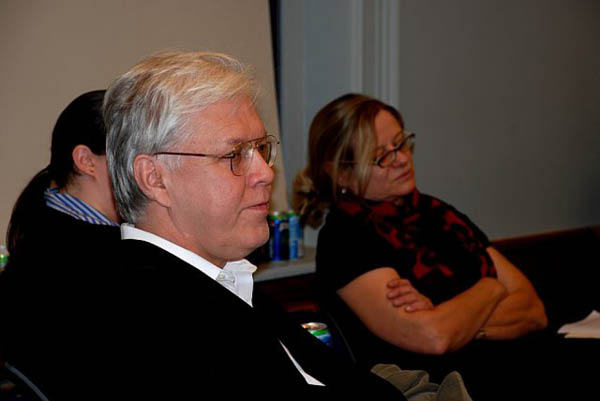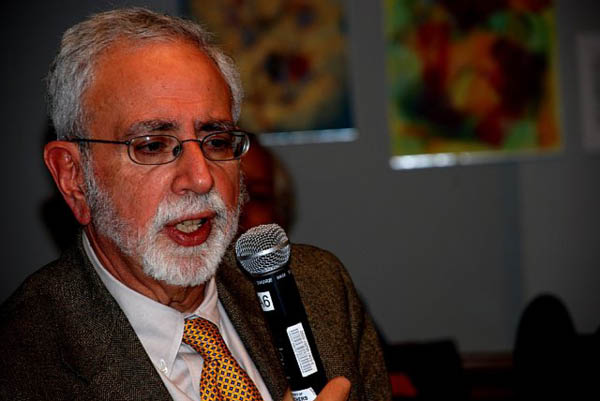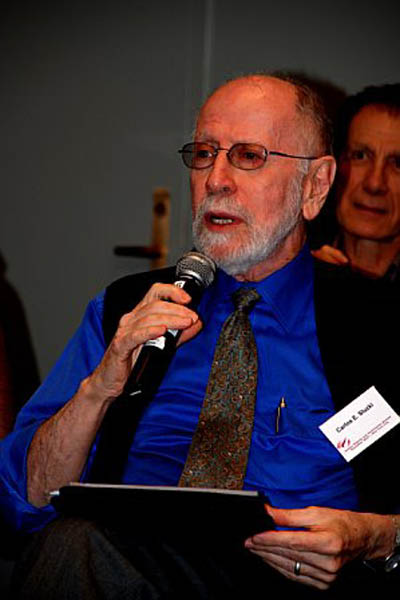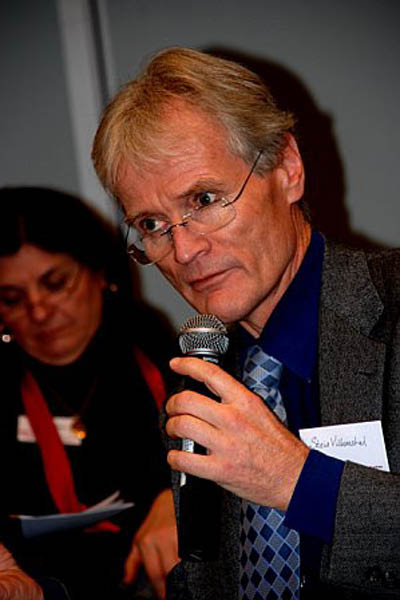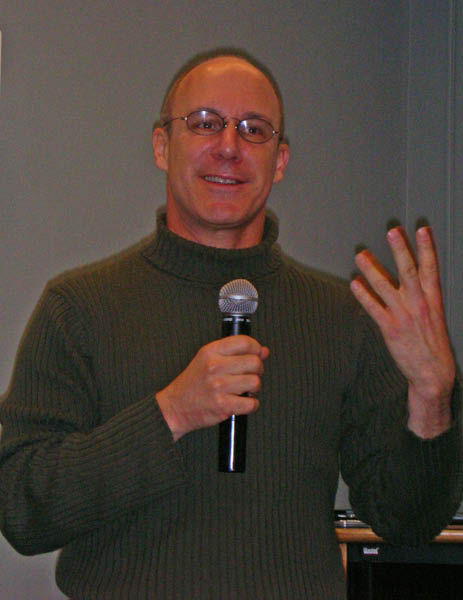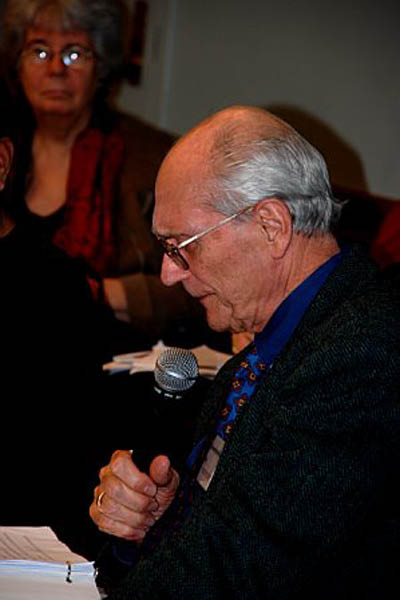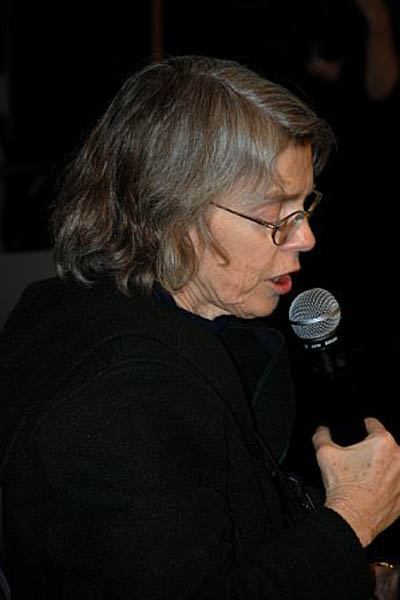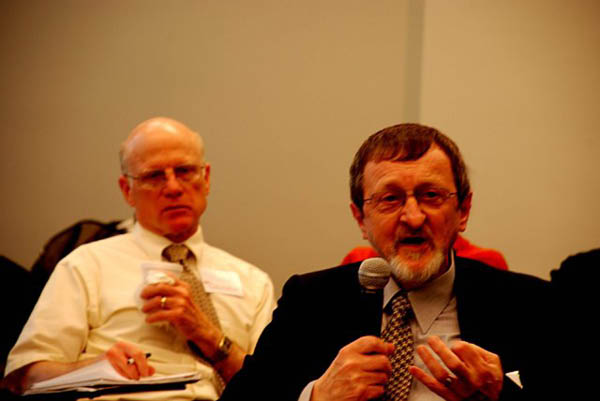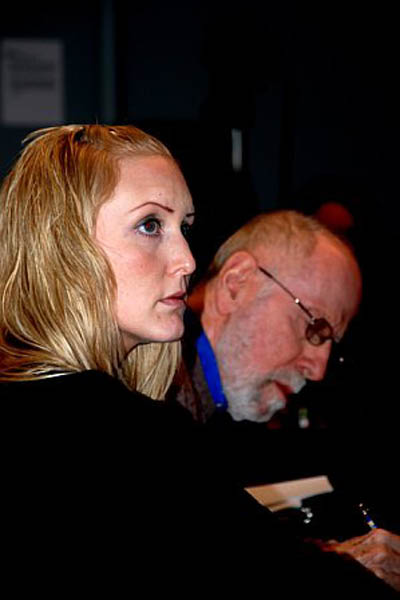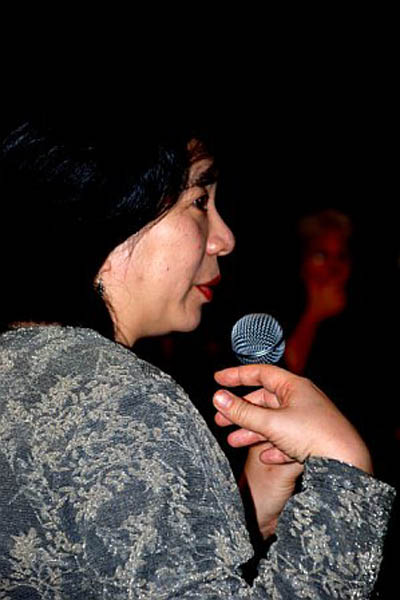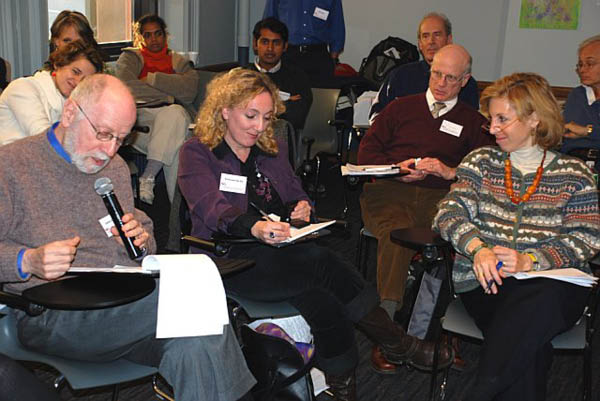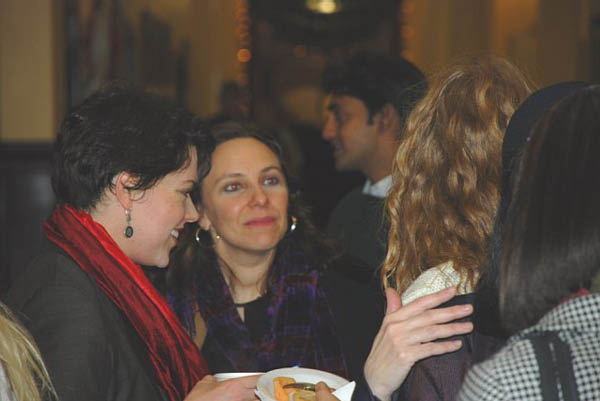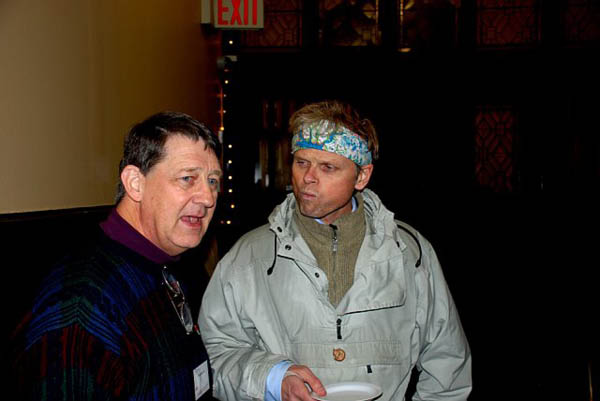2007 Workshop on Humiliation and Violent Conflict
representing the
10th Annual HumanDHS Conference
- dedicated to the memory of Don Klein -
December 13-14, 2007
New York City, Columbia University, Teachers College, 525 West 120th Street
(subway 1, exit 116th Street)
Morton Deutsch, Honorary Convenor

• Two-day Workshop, Thursday and Friday, December 13-14, 2007, 10.00 am - 5.30 pm, room 138 Horace Mann
• Public Event on Thursday evening, December 13, 2007, 5.00 pm – 8.00 pm, Milbank Chapel
Please see:
• Newsletter Nr. 10 , compiled subsequent to this workshop
• This workshop is the fourth one in a series that began in 2003: see the 2004, 2005, and 2006 workshops and a compilation of all NY workshops
• Our Workshops on Transforming Humiliation and Violent Conflict are convened by ICCCR - International Center for Cooperation and Conflict Resolution, with Morton Deutsch, its Director Emeritus, as our Honorary Convener,
on behalf of Human Dignity and Humiliation Studies (HumanDHS) as part of the
Columbia University Conflict Resolution Network (CU-CRN). We are very grateful to our hosts!
• We thank Kathryn Crawford for so kindly arranging Milbank Chapel for our workshop!
• To request disability-related accommodations and equipment, please contact OASID at oasid@tc.edu, (212) 678-3689, (212) 678-3853 TTY, (212) 678-3854 video phone
• This Workshop on Transforming Humiliation and Violent Conflict has been made possible by a generous contribution from the Slifka Foundation (please see the HumanDHS' Work: Objectives and Evidence of Success, developed in cooperation between HumanDHS and ABSF in 2006)
10th Annual Meeting of Human Dignity and Humiliation Studies in NY in 2007, December 13-15, 2007. Please click on the group picture above to see it larger, and on the main entrance of Teachers College to see last year's pictures of the venue of our workshop, Columbia University, Teachers College, and Milbank Chapel. The pictures above were taken by Brian Lynch in 2006 and 2007. (Important note to our conference particants: During our conference, we asked for your permission to be posted here, however, if you have changed your mind since, either in total or for specific pictures, please let us know! Thank you! Since we wish to walk the talk of dignity, it is very important for us to do our utmost in respecting everybody's privacy. We refrain from gathering written permissions from you during our conferences, since we value the building of mutual trust in relationships, and we also would like to refrain from contributing to an ever more bureaucratic and legalistic society.) |
|---|
  |
| Day One: The pictures above come from Brian's camera. Please click in the middle of the pictures above or here to see more of Brian's photos of Day One. |
   |
| Day One! The pictures above come from Evelin's camera. Please click in the middle of the pictures above or here to see more photos of Day One. The image from Google Analytics shows that this website had ca. 40,000 visits since December 2006, with 80,000 pageviews of an average of 2 minutes, from 183 countries. The picture on the right side is one of the "images of hope" that Florina Benoit and Ashok Gladston Xavier brought from India! Please note that the jacket Evelin is wearing is part of the HumanDHS World Clothes of Equal Dignity project! |
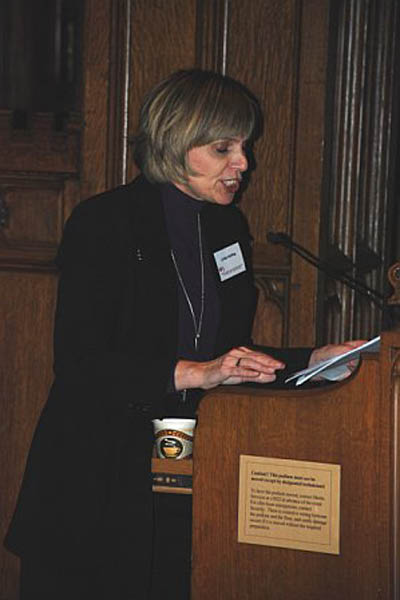 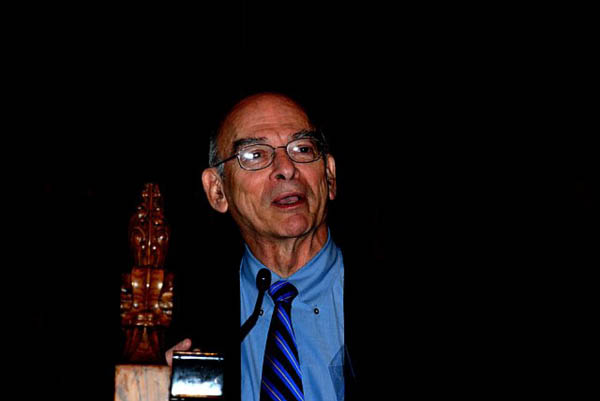   |
| The Public Event on Day One: The pictures above come from Brian's camera. Please click in the middle of the pictures above to see more of his photos of the Public Event. |
    |
| The Public Event on Day One: The pictures above come from John John Bruseth's and Evelin's camera. Please click in the middle of the pictures above to see more photos of the Public Event. |
 |
| Day Two: The picture above come from Brian's camera. Please click in the middle of the pictures above or here to see more of Brian's photos of Day Two. |
    |
| Day Two: The pictures above come from Evelin's camera. Please click in the middle of the pictures above or here to see more photos of Day Two. Unfortunately, the camera's battery went flat during Round Table 2. Therefore there are unfortunately no pictures on Evelin's camera from the rest of the day. |
  |
| The Day After! The pictures above come from Brian's camera. He first documented the discussion with Olympia Dukakis following the play "Masked," then the post-play get-together of some of us. Please click in the middle of the pictures above or here to see more of Brian's photos of the Day After. |
   |
| The Day After: The pictures above come from Evelin's camera. Please click in the middle of the pictures above or here to see more photos of the Day After. |
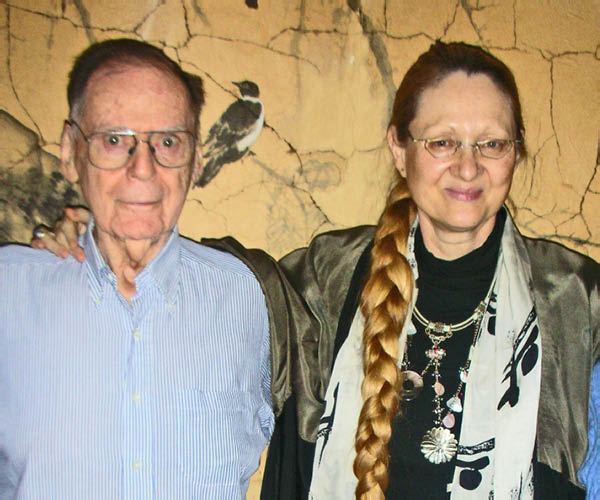 |
| Three days after: With Lydia and Morton Deutsch: Please click in the middle of the picture above or here to see more photos. |
Our Workshop Had Two Parts:
• Public Event - Everybody Is Always Warmly Invited to Attend!
Thursday, December 13, 2007, 5.00 pm – 8.00 pm
Columbia University, Teachers College, Milbank Chapel
Refreshments, a chance to mingle and meet
• Workshop
Thursday and Friday, December 13-14, 2007, 10.00 am - 5.00 pm
Columbia University, Teachers College, 138 Horace Mann, 525 West 120th Street, New York, NY 10027.
This part of our workshop was not public. You are warmly invited to get in touch with us, if you wish to participate.
• Where to stay
• Everybody is kindly asked to please arrange for your housing yourself. (Please see here the subway map of NY.) Please see accommodations in and around the Columbia University neighborhood (we thank Tony Jenkins for allowing us to use his compilation!)
• Please see also US SERVAS, hosting people generally for one to two nights. Any extension beyond that is up to the host to extend, and traveler to accept. Most NYC hosts do not host more than a week, if the visitor is someone they really feel comfortable with and grow to like. Again, that is up to the individual.
• Please see also couchsurfing.com.
• Please see furthermore Sara's New York Homestay, through which international students, visitors, interns or executives who come to New York (also Los Angeles, Paris or London) for a short period of time (1 to 12 months) can find a place to stay (four weeks Manhattan 1500 USD, one week 900 USD, less outside Manhattan; when you write to them, convey greetings from Evelin: I visited their office on November 19, 2007, and presented our HumanDHS group to Bernard Zagdanski, Sara’s husband).
• Please kindly note that...
• There is no registration fee for our conferences. To cover our expenses, we always summarize the costs during the conference and invite participants to contribute according to their ability. This collaborative approach to financing allows us to keep the conference affordable for all.
• We like to get to know participants prior to our conferences and workshops, and prior to issuing an invitation.
• All our gatherings are by invitation only, please approach us so that we can include you and register you. Only our Public Events are open to everybody without registration.
• The Non-Public Parts of our gatherings have limited enrollment.
• Participants are encouraged to find their own sources of funding or economic support to participate in our conferences. We offer our nurturing work as our gift of love and care to you, and we
would like to lovingly invite everybody to contribute to this gift economy. If you need funding for your travels and housing, please inquire in your country and your university about possibilities. See, among others, for the US, www.supportcenter.org and www.foundationscenter.org. The Weinstein International Fellowship program, inaugurated in 2008, provides opportunities for individuals from outside the United States to visit the U.S. to learn more about dispute resolution processes and practices and to pursue a project of their own design that serves to advance the resolution of disputes in their home countries.
• Participants are kindly asked to handle all of their travel arrangements and required documentation, including requests for visas, on their side. HumanDHS is a volunteer initiative and does not have staff or resources to assist with visa requests.
• Permissions
During our conferences, we always ask all participants for their permission to have their pictures or videos posted on our website, however, if you change your mind later, either in total or for specific pictures/videos, please let us know! Thank you! Since we wish to walk the talk of dignity, it is very important for us to do our utmost in respecting everybody's privacy. We refrain from gathering written permissions from you during our conferences, since we value the building of mutual trust in relationships, and we also would like to refrain from contributing to an ever more bureaucratic and legalistic society.
• What Happened in Our Previous Conferences?
Please have a look at all our previous conferences and at the newsletters written after these conferences. See newsletter Nr. 10, compiled subsequent to the 2007 workshop.
Overview
Frame
• Rationale
• How We Go About
• Frame
• List of Conveners
Program
• Public Event: Everybody is always warmly invited!
• Program (Day One & Day Two)
• Round Table 1: How is humiliation relevant to destructive conflict? (Day One)
• Round Table 2: How can the notion of humiliation be useful for public policy planning and for cultivating positive social change? (Day Two)
• Round Table 3: What works? What types of social change efforts show promise in reducing violent conflict and humiliation while upholding the dignity of all people? (Day Two)
Participants and Convening Organizations
• Participants (in all NY workshops so far, with their personal messages to the other participants)
• Details of the Convening Organizations
Papers
• Papers
Pictures
• Pictures of our 2004 NY workshop
• Pictures 2004 with Morton Deutsch
• Pictures of our 2005 NY workshop (from Evelin's camera)
• Pictures of our 2006 NY workshop (from Evelin's and Brian Lynch's cameras)
• Pictures of our 2007 NY workshop (from Evelin's, John John Bruseth's, and Brian Lynch's cameras)
Newsletters
• Newsletter 3, written as report subsequent to our 2004 NY workshop
• Newsletter 4, written in summer 2005
• Newsletter 5, written as report subsequent to our 2005 Berlin conference
• Newsletter 6, written as report subsequent to our 2005 NY workshop
• Newsletter 7, written as report subsequent to our 2006 Costa Rica conference
• Newsletter 8, written as report subsequent to our 2006 NY workshop
• Newsletter 9, written as report subsequent to our 2007 China conference
• Newsletter 10, written as report subsequent to our 2007 NY workshop
• Compilation of all NY workshops
Workshop Notes & Documentation
• the Conference Notes of the 2005 Workshop, Day One (thanks to Tonya et al.!)
• the Conference Notes of the 2005 Workshop, Day Two (thanks to Tonya et al.!)
• the Workshop Notes of the 2006 Workshop (thanks to Jessica et al.!):
• Round Table 1 - 12.14.06
• Round Table 2 - 12.15.06
• Round Table 3 - 12.15.06
• Public Event - 12.14.06
• What Now - 12.14.06
• What Now - 12.15.06
• 2007 video-tapes still to be edited
Rationale, Methodology, and Frame
Rationale
Given the current context of the field of international conflict, the impact of emotions on conflict has become one of the most important questions worldwide. However, there are only scattered publications in the research and applied literature that would address issues on conflict and emotion directly, as well as their relations and their impact on public policy.
The first two-day workshop was held at Teachers College, Columbia University, in 2004, hosted by the Columbia University's Conflict Resolution Network (CU-CRN), with special help from SIPA – Center for International Conflict Resolution (CICR) and the International Center for Cooperation and Conflict Resolution (ICCCR).
Since 2004, CICR on behalf of CU-CRN and HumanDHS invites selected groups of scholars, counselors, conflict resolution practitioners, mediators, and teachers among other professions for a two-day workshop every year to explore issues of conflict and emotions and its application to actual negotiations and diplomacy. The aim is to particularly probe the role of the notion of humiliation from the two different angles of conflict and emotion.
The workshops are envisaged as a learning community gathering, interactive and highly participatory. The purpose is to create an open space to identify and sharpen our understanding of the discourse and debate on emotion and conflict and the role that might, or might not be played by humiliation within this field. We hope to be able to continue this effort in follow-up workshops in the future.
We see humiliation as entry point into broader analysis and not as "single interest scholarship." We are aware that most participants focus on other aspects than humiliation in their work and have not thought about humiliation much, or even at all. We do not expect anybody to do so beforehand. We encourage that everybody comes with his/her background, his/her theoretical concepts and tools, and that we, during the conference, reflect together. We invite everybody to use their focus and give a thought to whether the notion of humiliation could be enriching, or not, and if yes, in what way. We warmly invite diverging and dissenting views.
How We Go About
In our conferences, we choose a dialogical methodology that stresses interaction and participation, because we wish to create an atmosphere of openness and respectful inquiry through Round Tables and, when appropirate, the use of Open Space Technology. We believe that notions such as dignity and respect for equal dignity are important not only for conflict resolution, but also for conferences such as our workshops. The name Human Dignity and Humiliation Studies attempts to express this. We wish to strive for consistency between what we think are important values for conflict resolution, and the way we conduct our work and our conferences.
We believe in "waging good conflict" (Jean Baker Miller). We believe that diverging opinions and perspectives need to be expressed and not avoided, because diversity enriches. However, diversity only enriches if embedded into mutual connection and appreciation. If not harnessed lovingly and caringly, diversity has the potential to divide, create hostility, and foster hatred and even violence. In the spirit of our vision, we, the HumanDHS network, wish therefore to avoid the latter and foster an atmosphere of common ground and mutual caring connection as a space for the safe expression of even the deepest differences and disagreements, and the toughest questions of humiliation, trauma, and injustice.
Every Round Table is being opened by brief remarks by each participant to present their entry points into the inquiry. In order to facilitate feedback, we are asking that papers/notes are sent in to us in advance. We wish to make available your brief synopsis of 1 to 4 pages, with references, prior to the workshop through this site so that all participants can meet virtually before meeting in person. Longer papers are welcome as well both prior and subsequent to our workshops, not least for the envisaged publications of the results of our conferences. Please notify us, if you wish to submit any of your papers also as a book chapter or as a journal article in our Journal of HumanDignity and Humiliation Studies.
All participants are warmly invited to send in their papers as soon as they can.
Frame
by Linda Hartling, Ph.D., Associate Director, Jean Baker Miller Training Institute, Wellesley College, Boston, USA
In our conferences we aim at creating a humiliation-free, collaborative learning environment characterized by mutual respect, mutual empathy, and openness to difference. The perspective of "appreciative enquiry" is a useful frame of our work. Our HumanDHS efforts are not just about the work we do together, but also about HOW WE WORK TOGETHER. At appropriate points during our conferences, for example at the end of each day, we take a moment to reflect on the practices observed that contributed to an appreciative/humiliation-free learning experience.
It is important to emphasize that an appreciative approach is not about expecting people to agree. In fact, differences of opinion enrich the conversation and deepen people's understanding of ideas. This could be conceptualized as "waging good conflict" (Jean Baker Miller), which means practicing radical respect for differences and being open to a variety of perspectives and engaging others without contempt or rankism. As we have seen in many fields, contempt and rankism drain energy away from the important work that needs to be done. Most people only know "conflict" as a form of war within a win/lose frame. "Waging good conflict," on the other side, is about being empathic and respectful, making room for authenticity, creating clarity, and growth.
Please see also:
- An Appreciative Frame: Beginning a Dialogue on Human Dignity and Humiliation, written by Linda in 2005
- Appreciative Facilitation: Hints for Round Table Moderators, written by Judith Thompson in February 2006 to support the moderators of our workshops
- Buddhist Teachings on Right Speech, kindly provided to us by Thomas Daffern in 2006, relating to our quest for appreciative enquiry, caring and being
List of Conveners
Evelin Gerda Lindner, Medical Doctor, Clinical and Social Psychologist, Ph.D. (Dr. med.), Ph.D. (Dr. psychol.), Organizer of the HumanDHS Conferences, Supporting the Local Conveners
Evelin G. Lindner is the Founding Director and President of Human Dignity and Humiliation Studies (HumanDHS). She is a transdisciplinary social scientist, and recipient of the 2006 SBAP Award, affiliated with the Columbia University Conflict Resolution Network, New York, the University of Oslo, Norway, Department of Psychology (folk.uio.no/evelinl/), and the Maison des Sciences de l'Homme, Paris. Lindner is also an Associate Professor at the Norwegian University of Science and Technology (NTNU) in Trondheim, Department of Psychology, Norway, and teaches globally, including in South East Asia, the Middle East, Australia, Africa, and other places globally. [read more]
Linda M. Hartling, Ph.D., Social Psychologist, Organizer of the HumanDHS Conferences, Supporting the Local Conveners
Linda Hartling is the Associate Director of the Jean Baker Miller Training Institute, Wellesley College, Boston, USA. Linda Hartling is a Member of the HumanDHS Board of Directors, a Member of the HumanDHS Global Advisory Board, Global Core Team, and Education Team. She is furthermore a Member of the Editorial Board of the Journal of Human Dignity and Humiliation Studies (JHDHS). [read more]
Please see:
• Humiliation: Real Pain, A Pathway to Violence, the draft of Linda's paper for Round Table 2 of our 2005 Workshop on Humiliation and Violent Conflict, Columbia University, New York.
• Humiliation: Assessing the Impact of Derision, Degradation, and Debasement, first published in The Journal of Primary Prevention, 19(4): 259-278, co-authored with T. Luchetta, 1999.
• Shame and Humiliation: From Isolation to Relational Transformation, the Jean Baker Miller Training Institute (JBMIT), Wellesley Centers for Women, Wellesley College No. 88, Wellesley, MA 02481, co-authored with Wendy Rosen, Maureen Walker, Judith V. Jordan, 2000.
• Humiliation and Assistance: Telling the Truth About Power, Telling a New Story, paper prepared for the 5th Annual Conference of Human Dignity and Humiliation Studies 'Beyond Humiliation: Encouraging Human Dignity in the Lives and Work of All People', in Berlin, 15th -17th September, 2005.

Preparatory meeting, November 28, 2007, for our 2007 Workshop on Humiliation and Violent Conflict at The International Center for Cooperation and Conflict Resolution (ICCCR), Teachers College, Columbia University, New York, NY. From left: Ines, Katharina, Mekayla, Kathryn, Evelin, Michael!
Please click on the picture above to see it larger.
Andrea Bartoli, Ph.D.
Andrea Bartoli is the former Director of the Center for International Conflict Resolution (CICR); Chairman of the Columbia University Conflict Resolution Network (CU-CRN). Andrea Bartoli has a Principle Host Place on the HumanDHS Global Advisory Board. He was a significant force behind this workshop series from its start.
Program
Day One, Thursday, December 13, 2007
9.15 am Registration Starts
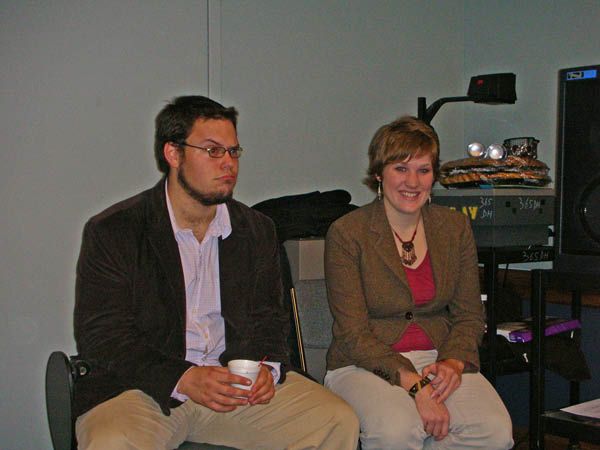
Jennifer Kirby, and Robert English managed our registration table: Thank you!
Please click in the middle of the picture on the left to see more photos of Day One from Evelin's camera. Please click in the middle of the picture on the right to see more photos of Day One from Brian's camera.
Rick Slaven was our Seating Manager! And he took care of our food, guarding it against hungry by-passers! He stepped in whenever anything was needed! Thanks most warmly for your great support, dear Rick!

Videotaping: Hua-Chu Yen, photography: Brian Lynch
Thanks most warmly for your great support, dear Hua-Chu Yen, and dear Brian!


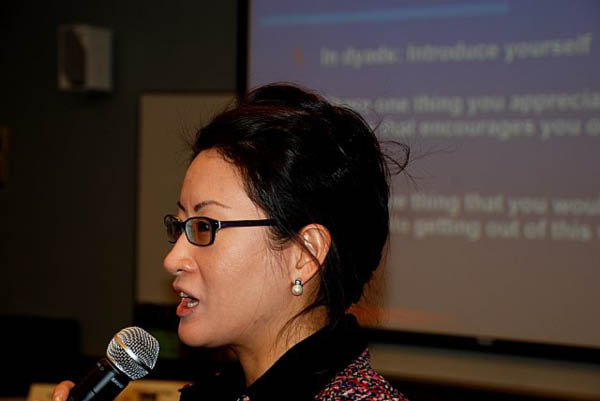
More helpers: Kathryn Crawford, Michael Britton, Marta Carlson, Camilla Hsiung, Antoinette Errante Thanks most warmly for your great support!
10.00 am Welcoming All Participants
Andrea Bartoli, Ph.D., former Director of the Center for International Conflict Resolution (CICR) and Chairman of the Columbia University Conflict Resolution Network (CU-CRN), and Beth Fisher Yoshida, Associate Director of the International Center for Cooperation & Conflict Resolution at Teachers College, Columbia University, welcomed the participants.

Please click in the middle of the picture on the left to see more photos of Day One from Evelin's camera. Please click in the middle of the picture on the right to see more photos of Day One from Brian's camera.Donald Klein and Linda Hartling usually set the frame of our conferences within "Appreciative Enquiry," and we create a list of agreed upon norms having to do with the nature and tone of our dialogue. Linda always keeps our workshop together with her continuous caring interventions, while Don's caring wisdom always saved our conferences in crucial moments.

Please click in the middle of the picture on the left to see more photos of Day One from Evelin's camera. Please click in the middle of the picture on the right to see more photos of Day One from Brian's camera.
To our immense sadness, our beloved Don Klein passed away in June 2007. We are heartbroken. We commemorate his memory with great love. He spoke to us about Awe and Wonderment. About our human ability to live in awe and wonderment, not just when we see a beautiful sun set or the majesty of the ocean, but always. That we can live in a state of awe and wonderment. And we do that, says Don, by leaving behind the psychology of projection. The psychology of projection is like a scrim, a transparent stage curtain, where you believe that what you see is reality only as long as the light shines on it in a certain way. However, it is not reality. It is a projection. And in order to live in awe and wonderment, we have to look through this scrim and let go of all the details that appear on it, in which we are so caught up. When we do that, we can see the beautiful sun set, the majestic ocean, always, in everything. We will continue our work while keeping Don's words at the center of our work and in our hearts.
We kept a moment of "awe and wonderment" in honor of our beloved Don!
Please read An Appreciative Frame: Beginning a Dialogue on Human Dignity and Humiliation, that Linda has written for us in 2005.
It is important to note that our appreciative frame is a HumanDHS-defined version of AE. We believe in "waging good conflict" (Jean Baker Miller). We believe that diverging opinions and perspectives need to be expressed and not avoided, because diversity enriches. However, diversity only enriches if embedded into mutual connection and appreciation. If not harnessed lovingly and caringly, diversity has the potential to humiliate, divide, create hostility, foster hatred, and even violence. In the spirit of our vision, we, the HumanDHS network, wish therefore to avoid the latter, and instead open up a space of common ground and mutually caring connections, a space for the safe expression of even the deepest differences and disagreements, and the toughest issues of humiliation, trauma, and injustice.
We welcomed our participating visual artists:
• Judith Peck - please see Judith's message to all participants
• Patricia W. Hall (Risha) - please see Risha's message to all participants
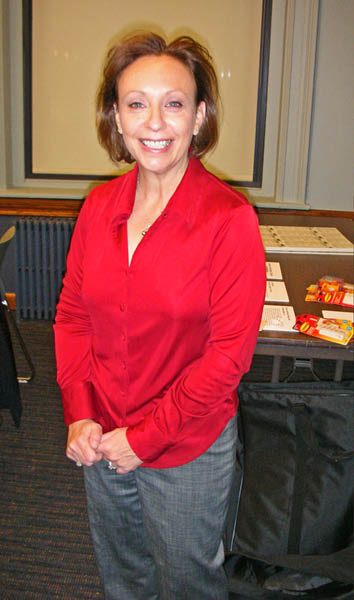
Please see Judith on the left side and "Love Obscured" by Risha on the right side.
Please click in the middle of the picture on the left to see more photos of Day One from Evelin's camera. Please click in the middle of the picture on the right to see more photos of Day One from Brian's camera.
10.15 am Participants Introduced Themselves
11.30 am - 12.30 pm Introductory Presentation
Evelin Lindner, Founding Director and President of HumanDHS
This talk has two parts, related to Evelin's two roles. Her first role is to be the principal convener, together with Linda M. Hartling, of this workshop and our overall HumanDHS network. Her second role is to be one HumanDHS researcher among many. Respectively, the first part of her talk addresses the overall aim of our HumanDHS work (see here a transcription), while the second part gives a very brief introduction to her theory of humiliation. She uses a particularly broad lens, both with respect to the length of history she includes (entire human history), as well as with respect to its transcultural and transdisciplinary approach. Her theory highlights how globalization is interlinked with new and unprecedented psychological dynamics (among others, the emerging significance of the phenomenon of humiliation) that call for novel solutions at all levels - macro, meso, and micro levels, and in all fields of of inquiry and implementation into public policy.
Please see early versions of the second part, Humiliation in a Globalizing World: Does Humiliation Become the Most Disruptive Force? here or at http://ssrn.com/abstract=668742 (this paper's SSRN ID is 668742); see for a more recent version the first issue of the Journal of Human Dignity and Humiliation Studies, March 2007.

Please click in the middle of the picture on the left to see more photos of Day One from Evelin's camera. Please click in the middle of the picture on the right to see more photos of Day One from Brian's camera.
Please note that the jacket Evelin is wearing is part of the HumanDHS World Clothes of Equal Dignity project
12.30 pm - 1.15 pm Catered Lunch & Art Show & Announcements
Linda Hartling announced:
• May we share the great news with you that we now have non-for profit status. (So far not yet globally - as we would wish for - but, to start with, in NY state.) Please see our Contributions page. We all thank Nitza, Linda and Rick for their incredible work to make this happen!
• Linda created space for discussion forums for us on Ning.com.
• We would like to collect stories/cases/witness accounts of dignity and humiliation.
• We would like to seed our Call to Creativity with actual examples to encourage people to submit their own achievements and ideas.
• See also a list over our achievements.
Philip Brown announced:
• Phil announced that we are invited to create "Humiliation in the Academic Setting," A Special Symposium Issue of Experiments in Education, published by the S.I.T.U. Council of Educational Research, India.
Evelin Lindner announced:
• Linda Hartling donated $1000 to HumanDHS in loving memory of Don Klein. A million thanks, dearest Linda!
• We have two yearly conferences, the Workshop on Humiliation and Violent Conflict in December at Columbia University in NY, and an outside-of-the-US conference. This year this conference took place in Hangzhou, China, in April 2007. Our next conference will be in Norway in June 2008.
• Good news for our work to promote equal dignity for all and transcend humiliation! Betsy Kawamura and Rune Kvist Olsen are in the process of founding The Equal Dignity Group - Den Likeverdige Organisasjonen - for Sustainable Institutional Change in Society. See their message to our workshop.
• Good news for our work to promote equal dignity for all and transcend humiliation! The magazine Choice just released its list naming its 2007 Outstanding Academic Titles, and Evelin's book Making Enemies: Humiliation and International Conflict is among them. Thanks to YOUR inspiration and support, this has been possible!
• Global Coordinating Team: We need more helpers, people who would love to commit for a longer time period, who would have ample time (like half a day per day), who would know how to write appreciative emails, and how to maintain a website.
• Please welcome and celebrate Michael Britton’s leadership of the Global Coordinating Team, especially his compassionate approach walking the talk of human dignity. Michael is the HumanDHS Director of "Global Appreciative Culturing." He has been negotiating up to 1000 emails weekly (channeled to him by Evelin), and continues to establish positive, appreciative relationships with people new to the network.
• We look for directors/coordinators for our Intervention projects. See for example our World Clothes for Equal Dignity project. Companies who are already in the fashion business, might be interested? See also our World Art for Equal Dignity project, where Peter Max offers us to paint portraits and give the 20,000 - 30,000 USD remuneration to us. Please find people who wish to have a portrait by Peter Max!
• Good news for our Office Cockpit Project! We have a Director and Coordinator! Please welcome Sigurd Støren!
• We would be very happy if more people were to volunteer to help our rapporteurs!
• See here a “wish list” over ways to contribute to our work (we no longer take notes but do video taping)!
• We need NY homestays!
• On the “wish list” you see, for example, you see that we would like to carry out a Literature Review of Survey Instruments Relevant to Human Dignity and Humiliation.
1.15 pm - 3.00 pm Round Table 1: How is Humiliation Relevant to Destructive Conflict?
Moderators: Michael Britton & Beth Fisher-Yoshida (Moderators are invited to temporarily switch into the role of discussants if they wish so)
Seating Manager: Rick Slaven
Helpers: Kathryn Crawford, Michael Britton, Brian Lynch, Jennifer Kirby, Robert English, Marta Carlson, Camilla Hsiung, Antoinette Errante, Hua-Chu Yen


Please click in the middle of the picture on the left to see more photos of Day One from Evelin's camera. Please click in the middle of the picture on the right to see more photos of Day One from Brian's camera.
There are four ways to participate in a Round Table: As a discussant, a moderator, a note taker/rapporteur, and a supporter
We liked the Round Table discussion format we first used in our 2004 NY conference. Everyone has ca. 10 minutes to present their entry point into the discussion, then we have an open discussion. We have 2 empty chairs in the circle that can be taken by participants from the audience who wish to introduce a question or comment.
We also liked the experience with two moderators for each Round Table. In that way, the moderators are not prevented from also being participants. While one moderator makes a contribution as a participant, the other takes over, and vice versa. With only one moderator, s/he would not be so flexible.
Please see Appreciative Facilitation: Hints for Round Table Moderators, kindly written in February 2006 by Judith Thompson to support the moderators of our workshops.
We kindly invite the moderators to summarize the discussion immediately following the Round Table discussion, and to identify
1. three "Key Learning Points" from the discussion
2. one question/consideration for continued inquiry
3. one idea for action.Participants:
• Morton Deutsch (unfortunately hindered to join us in person, Morton was with us in spirit)
Destructive Conflict and Oppression (2004)

Please click in the middle of the picture to see more photos of Evelin's visit to Lydia and Morton Deutsch on December 17, 2007.
• Aaron Lazare
Humiliation and Apology (2007)

Please click in the middle of the picture on the left to see more photos of Day One from Evelin's camera. Please click in the middle of the picture on the right to see more photos of Day One from Brian's camera.
• Andrea Bartoli (Andrea kindly joined us in the beginning and at the end of Day One)
Deconstructing International Deadly Conflicts (2004)
• Shibley Telhami (unfortunately, snowstorm hindered Shibley Telhami to join us)
History and Humiliation (2003)• Adenrele Awotona
The Role of Dignity and Humiliation for Rebuilding Sustainable Communities after Disasters (2007)

Please click in the middle of the picture on the left to see more photos of Day One from Evelin's camera. Please click in the middle of the picture on the right to see more photos of Day One from Brian's camera.
• Arie Nadler
- Intergroup Reconciliation: Effects of Adversary’s Expressions of Empathy, Responsibility, and Recipients’ Trust, in Personality and Social Psychology Bulletin, 2006, 32 (4, April), pp. 459-470, together with Ido Liviatan.
- Instrumental and Socio-Emotional Paths to Intergroup Reconciliation and the Need-Based Model of Socio-Emotional Reconciliation, to appear in: A. Nadler, T. Malloy & J.D. Fisher (eds.) Social Psychology of Intergroup Reconciliation. New York, NY: Oxford University Press, together with Nurit Shnabel, 2006.
- Inter-Group Helping as Status Organizing Processes: Implications for Inter-Group Misunderstandings, in press in: Demoulin, S., Leyens, J.P. & Dovidio, J.F. (Eds.): Intergroup Misunderstandings: Impact of Divergent Social Realities. Washington, DC: Psychology Press, April 2007, revised version, together with Samer Halabi, and Gal Harpaz-Gorodeisky.

Please click in the middle of the picture on the left to see more photos of Day One from Evelin's camera. Please click in the middle of the picture on the right to see more photos of Day One from Brian's camera.• James E. Jones (unfortunately hindered to join us)
The Post Victim Ethical Exemption Syndrome: An Outgrowth of Humiliation (2006)
The Third Force: A Practical, Community-Building: Approach to Settling Destructive Conflicts (2004)• Michael L. Perlin
Humiliation and the Criminal Justice System: How Our Desire to Humiliate Contributes to Recidivism and, Ultimately, Injures Victims (2007)

Please click in the middle of the picture on the left to see more photos of Day One from Evelin's camera. Please click in the middle of the picture on the right to see more photos of Day One from Brian's camera.• Carlos E. Sluzki
- Analysis of an Extraordinary Political Discourse (2007)
- Humiliation and the Moral Authority to Exert Violence upon Others (2007)
- Elements of Humiliation-Shame Dynamics for Computational Modeling and Analysis of Real-Life Scenarios (2004)
- The Story of the Crying Composer told at the Workshop on Humiliation and Violent Conflict, NY (2004)
- Humiliation Therapeutics (powerpoint presentation, 2004)

Please click in the middle of the picture on the left to see more photos of Day One from Evelin's camera. Please click in the middle of the picture on the right to see more photos of Day One from Brian's camera.
• Sara Cobb (unfortunately hindered to join us)
- The Role of the Perpetrators in Breaking the Cycle of Violence (2007)
- "Humiliation" as Positions in Narratives: Implications for Policy Development (2004)• Clark McCauley
Author of Why Not Kill Them All? The Logic and Prevention of Mass Political Murder (Princeton University Press, 2006, together with Daniel Chirot)
Understanding Humiliation As Suppressed Anger (2006)

Please click in the middle of the picture on the left to see more photos of Day One from Evelin's camera. Please click in the middle of the picture on the right to see more photos of Day One from Brian's camera.• Florina Benoit & Ashok Gladston Xavier
The Life of Sri Lankan Refugees A Paradigm Shift (2007)

Please click in the middle of the picture on the left to see more photos of Day One from Evelin's camera. Please click in the middle of the picture on the right to see more photos of Day One from Brian's camera.• Stein Villumstad
Religions for Peace-International (2007)
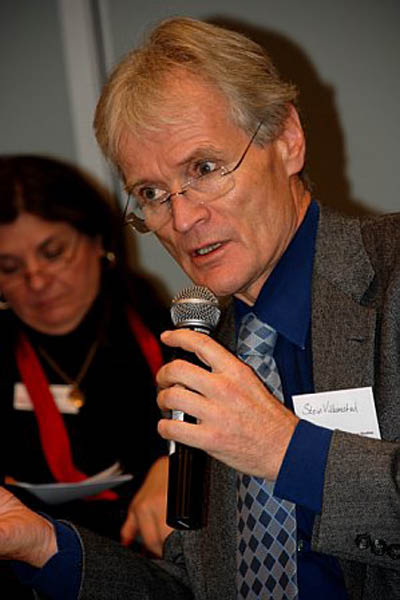
Please click in the middle of the picture on the left to see more photos of Day One from Evelin's camera. Please click in the middle of the picture on the right to see more photos of Day One from Brian's camera.• Michael Greene
The Role of Humiliation for the Generation of Violence (2007)

Please click in the middle of the picture on the left to see more photos of Day One from Evelin's camera. Please click in the middle of the picture on the right to see more photos of Day One from Brian's camera.• Beth Fisher-Yoshida
Reframing Conflict: Intercultural Conflict as Potential Transformation (2005)
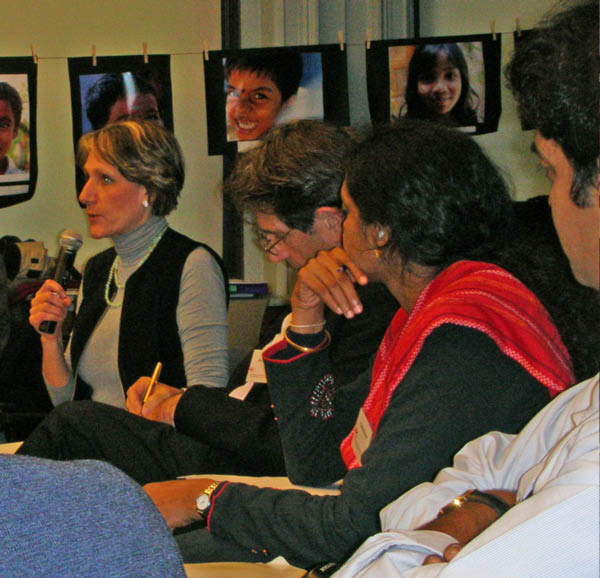
Please click in the middle of the picture on the left to see more photos of Day One from Evelin's camera. Please click in the middle of the picture on the right to see more photos of Day One from Brian's camera.• Michael Britton
Connecting the Deep Personal Experiences of Being in Historical Contexts with Reaching Outward Around the Globe (2006)

Please click in the middle of the picture on the left to see more photos of Day One from Evelin's camera. Please click in the middle of the picture on the right to see more photos of Day One from Brian's camera.
Supporters of Round Table 1 (supporters participate by using the two empty chairs in each Round Table; please see a list of supporters to all three Round Tables here):
• Janet Gerson
The Role of Dignity and Humiliation for Peace Education (2007)• Anie Kalayjian
Turkish Denial of the Genocide of Armenians, Greeks, Assyrians: Transforming Humiliation into Understanding and Forgiveness (2005)
• Grace Feuerverger
- The "School For Peace": A Conflict Resolution Program in a Jewish-Palestinian Village (2005)
- Grace also presents her second book Teaching, Learning and Other Miracles (2007)• Lone Alice Johansen
African Solutions to African Intergroup Conflicts: Ubuntu and Humiliation - A Study of Ubuntu and Its Effect on Perceived Humiliation in a Interactive Track Two Dialogue Seminar (2007)• Judith E. Glaser
Author of Creating We, CEO of Benchmark Communications, Inc.• Bertram Wyatt-Brown
- The Humiliation of Male Rape: The Case of T. E. Lawrence (2007)
- The Psychology of Humiliation: Mann’s “Mario and the Magician” and Hawthorne’s “Major Molineux, My Kinsman” (2006)
• Anne Wyatt-Brown
- A Challenge to Medical Hierarchies (2007)
- Humiliation in My Brother’s Image (2006)• Sharon Burde
The Role of Women in Addressing the Impact of Humiliation and Changing Course (2007)• Roger Bromley
Dignity and Hope Versus Humiliation and Despair (2007)
(please see here a longer draft for a full paper and a summary)• Jennifer Goldman
Humiliation and Aggression (2006)
A Theoretical Understanding of How Emotions Fuel Intractable Conflict: The Case of Humiliation (2005, together with Peter T. Coleman)• Philip Brown
The Role of Dignity and Humiliation for Character Education (2007)• Maggie O'Neill
Humiliation and Human Dignity: Conducting Participatory Action Research with Women Who Sell Sex (2007, see www.safetysoapbox.co.uk)• Emanuela C. Del Re
The Role of Dignity and Humiliation for Security (2007)• George Woods (unfortunately hindered to join us)
The Role of Dignity and Humiliation for Developing New Non-Western Psychology (2007)• Judy Kuriansky (unfortunately hindered to join us)
Transforming Conflict and Humiliation to Heal Hearts in the Holy Land: People-to-People Projects to Build Peace, Coexistence and Cooperation between Palestinians and Israelis (2006)• Maria Volpe (unfortunately hindered to join us)
The Association for Conflict Resolution Crisis Intervention online newsletter featured this presentation in its 2006 February issue.• Olga Botcharova (unfortunately hindered to join us)
Olga presents an adaptation of Implementation of Track Two Diplomacy: Developing a Model of Forgiveness, in Helmick, Raymond G. and Petersen, Rodney L. (Eds.), Forgiveness and Reconciliation: Religion, Public Policy and Conflict Transformation (pp. 269-293). Philadelphia, PA: Templeton Foundation Press.• Rosita Albert (unfortunately hindered to join us)
Violent Interethnic Conflict and Human Dignity: Major Issues in Intercultural Research and Knowledge Utilization (2006)• Aura Sofia Diaz (unfortunately hindered to join us)
The Role of Dignity and Humiliation for the Mind and Peace (2007)• Victoria C. Fontan (unfortunately hindered to join us)
Shame, Humiliation, and Violent Conflict (2007)• Merle Lefkoff (unfortunately hindered to join us)
When the Butterfly Flaps Her Wings in Gaza (2005)• Annette Anderson-Engler (unfortunately hindered to join us)
- Constructing and Reconstructing Narratives – A Passageway to Personal Meaning and Social Change (2007)
- Displaced Identity and Humiliation in Children of Vietnam Veterans (2005)• Edward Emery (unfortunately hindered to join us)
Musings on Shame and Idolization (2007)Please see here the supporters of all three Round Tables
The History of Round Table 1:
Round Table 1, 2006
Round Table 1 in 2006 was entitled How is Humiliation Relevant to Destructive Conflict?
The moderators were Donald Klein & Beth Fisher-Yoshida
Please see the participants and their contributions hereRound Table 1, 2005
Round Table 1 in 2005 was entitled What's Relevant in Destructive Conflict?
The moderators were Beth Fisher-Yoshida & Miriam Marton
Please see the participants and their contributions here.Round Table 1, 2004
Round Table 1 in 2004 was entitled What's Relevant in Destructive Conflict?
The moderator was Beth Fisher-Yoshida
Please see the participants here.
3.00 pm - 3.15 pm The Moderators Summarized the Round Table Discussion and Identified
1. three "Key Learning Points" from the discussion
2. one question/consideration for continued inquiry
3. one idea for action
3.15 pm - 3.30 pm Small Break
3.30 pm - 4.30 pm Global Dignity & Humiliation Assessment Initiative Session
William McConochie kindly offered to support our Global Dignity & Humiliation Assessment Initiative

Please click in the middle of the picture on the left to see more photos of Day One from Evelin's camera. Please click in the middle of the picture on the right to see more photos of Day One from Brian's camera.Contributions sent to us from afar digitally:
• Sabina Alkire and Emma Samman (Oxford Poverty and Human Development Initiative)
Shortlisted Indicators on Humiliation, and a Note Explaining Research Interests and Progress to Date at OPHI (2007)
Contribution presented at the 2007 Workshop on Humiliation and Violent Conflict, Columbia University, New York, December 13-14, 2007 (see also a Paper on Shame and Humiliation (2007) by Diego Zavaleta Reyles).
• Hroar Klempe & Torbjørn Rundmo (Department of Psychology, NTNU, Trondheim, Norway)
The Reliability and Validity of a Measurement Instrument of Culture Defined As Symbol Exchange (2007)
Contribution presented at the 2007 Workshop on Humiliation and Violent Conflict, Columbia University, New York, December 13-14, 2007, as Power Point presentation and as Pdf file.
• Sophie Schaarschmidt
Contribution presented at the 2007 Workshop on Humiliation and Violent Conflict, Columbia University, New York, December 13-14, 2007.They could unfortunately not join us in person, but they were with us in spirit and sent us their best wishes
Arye Rattner, Elizabeth Miller, Patricia Rodriguez MosqueraOur participants who were present in person:
• Linda Hartling
- Humiliation: Assessing the Specter of Derision, Degradation, and Debasement, Doctoral dissertation, Union Institute, Cincinnati, Ohio, 1996.
- Humiliation: Assessing the Impact of Derision, Degradation, and Debasement, first published by: The Journal of Primary Prevention, 1999, 19(4): 259-278.• Emanuela C. Del Re
The Role of Dignity and Humiliation for Security (2007)• Maggie O'Neill
Maggie's theoretical concept of ethno-mimesis (the inter-connection of sensitive ethnographic work and visual re-presentations) is a methodological tool as well as a process for exploring lived experience, displacement, exile, belonging and humiliation.• Lone Alice Johansen
African Solutions to African Intergroup Conflicts: Ubuntu and Humiliation - A Study of Ubuntu and Its Effect on Perceived Humiliation in a Interactive Track Two Dialogue Seminar (2007)• Lee Beaumont
Metrics - A Practical Example, and Thoughts on a Measurements Plan (2007)
Contribution presented at the 2007 Workshop on Humiliation and Violent Conflict, Columbia University, New York, December 13-14, 2007.
• Michael Sayler
Tracking Humiliation with CMM (2007)
Contribution presented at the 2007 Workshop on Humiliation and Violent Conflict, Columbia University, New York, December 13-14, 2007.• Jennifer S. Goldman
The Differential Effects of Collective-level vs. Personal-level Humiliating Experiences (2007)
Doctoral dissertation in Social-Organizational Psychology at Teachers College, Columbia University, New York, focusing on the role that humiliation plays in exacerbating violent social conflict.• Floyd Webster Rudmin
Preventing Inadvertent Humiliation (2006)
Six Research Designs on Humiliation (2005)• James Westaby (unfortunately hindered to join us)
• Pamela H. Creed (unfortunately hindered to join us)
Helpers: Kathryn Crawford, Michael Britton, Brian Lynch, Jennifer Kirby, Robert English, Marta Carlson, Camilla Hsiung, Antoinette Errante, Hua-Chu Yen
We discussed our Global Dignity & Humiliation Assessment Initiative. Our aim with this session was to pool the efforts of all participants and make a plan for the next steps that we need to take during the coming year.
See here a Background Document. Many suggested at our 2005 and 2006 conferences that we need to find a way to measure dignity and humiliation in societies so that we can show to policy makers that humiliation is relevant and needs to be included into public policy making (see also our Public Policy for Equal Dignity project). Ultimately, all institutions (from marriage to the United Nations) need scrutiny and restructuring so as to prevent that they have humiliating effects.
4.30 pm - 5.00 pm Wrapping Up Day One
Cleaning up so that we leave the room clean at 5.00 pm.
5.00 pm End of the Closed Part of Day One of Our Workshop
5.00 pm - 8.00 pm Public Reception at Milbank Chapel with Eminent Scholars and Leading Thinkers. Everybody Is Invited!

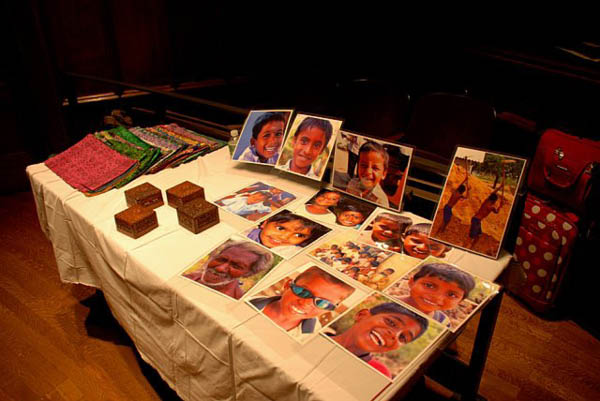
Please click in the middle of the picture on the left to see more photos of the Public Event from Evelin's camera. Please click in the middle of the picture on the right to see more photos of the Public Event from Brian's camera.
• 5.00-5.30 pm Reception
We have refreshments!
We mingle and meet!
• Please see here 2006's Public Event Program
• Please see here 2005's Public Event Program
• Please see here 2004's Public Event Program
Please Welcome Our Participating Visual Artists
• Judith Peck - please read Judith's message to all participants!
• Patricia W. Hall (Risha) - please read Risha's message to all participants!
• 5.30-5.45 pm Musical Introduction by Ikhlaq Hussain, Master Sitarist, Performs for Us Raga Aiman

Please click in the middle of the picture on the left to see more photos of the Public Event from Evelin's camera. Please click in the middle of the picture on the right to see more photos of the Public Event from Brian's camera.
• 5.45-6.00 pm Linda Hartling Welcomed Everybody
6.00 pm - 6.30 pm Honored Presentation Humiliation and Apology
Aaron Lazare, Chancellor, Dean and Professor of Psychiatry at the University of Massachusetts Medical School.
Aaron Lazare is the author of the book On Apology (2004, New York, NY: Oxford University Press). He writes there, “I believe that humiliation is one of the most important emotions we must understand and manage, both in ourselves and in others, and on an individual and national level” (page 262).

Please click in the middle of the picture on the left to see more photos of the Public Event from Evelin's camera. Please click in the middle of the picture on the right to see more photos of the Public Event from Brian's camera.
6.30 - 7.00 pm Honored Presentation History and Humiliation
Shibley Telhami, Anwar Sadat Professor for Peace and Development at the University of Maryland, College Park, and non-resident Senior Fellow at the Saban Center at the Brookings Institution (unfortunately, snowstorm hindered Shibley Telhami to join us)
Please see furthermore How The Fighting Stops: Achieving a Sustainable Ceasefire in Lebanon, to which Shibley Telhami explains (August 3, 2006): "You may note that in my most recent comment on Lebanon at the Brookings Institution, which was televised in the US, I highlighted the issue of humiliation and suggested that the solution to the problem must be based on a balance between deterrence on the one hand and dignity on the other. The discussion could be watched on video or be read at www.brookings.edu. The transcript can be accessed directly at: http://brookings.edu/comm/events/20060731.pdf."
6.30 - 7.00 pm Honored Presentation History and Humiliation
Andrea Bartoli, Former Director of the Center for International Conflict Resolution (CICR); Chairman of the Columbia University Conflict Resolution Network (CU-CRN). Andrea Bartoli has a Principle Host Place on the HumanDHS Global Advisory Board.

Please click in the middle of the picture on the left to see more photos of the Public Event from Evelin's camera. Please click in the middle of the picture on the right to see more photos of the Public Event from Brian's camera.
• 7.00-7.50 pm Panel & Discussion
15 minute presentations by panelists followed by an open discussion with all of the evening speakers
• The Humiliation Dynamic: Looking Back... Looking Forward
Donald Klein, Union Institute and University, Cincinnati, Ohio, USA Donald Klein is a Member of the HumanDHS Board of Directors, a Member of the HumanDHS Global Advisory Board and Global Core Team.
To our immense sadness, our beloved Don Klein passed away in June 2007. We are heartbroken. We commemorate his memory with great love. He spoke to us about Awe and Wonderment. About our human ability to live in awe and wonderment, not just when we see a beautiful sun set or the majesty of the ocean, but always. That we can live in a state of awe and wonderment. And we do that, says Don, by leaving behind the psychology of projection. The psychology of projection is like a scrim, a transparent stage curtain, where you believe that what you see is reality only as long as the light shines on it in a certain way. However, it is not reality. It is a projection. And in order to live in awe and wonderment, we have to look through this scrim and let go of all the details that appear on it, in which we are so caught up. When we do that, we can see the beautiful sun set, the majestic ocean, always, in everything. We will continue our work while keeping Don’s words at the center of our work and in our hearts.
We kept a moment of "awe and wonderment" in honor of our beloved Don!• The Role of Dignity and Humiliation for Intergroup Reconciliation
by Arie Nadler, Professor of Social Psychology, Dean, Tel Aviv University, Israel
Please see:
- Intergroup Reconciliation: Effects of Adversary’s Expressions of Empathy, Responsibility, and Recipients’ Trust, in Personality and Social Psychology Bulletin, 2006, 32 (4, April), pp. 459-470, together with Ido Liviatan.
- Instrumental and Socio-Emotional Paths to Intergroup Reconciliation and the Need-Based Model of Socio-Emotional Reconciliation, to appear in: A. Nadler, T. Malloy & J.D. Fisher (eds.) Social Psychology of Intergroup Reconciliation. New York, NY: Oxford University Press, together with Nurit Shnabel, 2006.
- Inter-Group Helping as Status Organizing Processes: Implications for Inter-Group Misunderstandings, in press in: Demoulin, S., Leyens, J.P. & Dovidio, J.F. (Eds.): Intergroup Misunderstandings: Impact of Divergent Social Realities. Washington, DC: Psychology Press, April 2007, revised version, together with Samer Halabi, and Gal Harpaz-Gorodeisky.

Please click in the middle of the picture on the left to see more photos of the Public Event from Evelin's camera. Please click in the middle of the picture on the right to see more photos of the Public Event from Brian's camera.• Appreciative Enquiry and Humiliation
by Linda Hartling, Ph.D., Associate Director, Jean Baker Miller Training Institute, Wellesley College, Boston, USA
In our conferences we aim at creating a humiliation-free, collaborative learning environment characterized by mutual respect, mutual empathy, and openness to difference. The perspective of "appreciative enquiry" is a useful frame of our work. Our HumanDHS efforts are not just about the work we do together, but also about HOW WE WORK TOGETHER. At appropriate points during our conferences, for example at the end of each day, we take a moment to reflect on the practices observed that contributed to an appreciative/humiliation-free learning experience.
Please read An Appreciative Frame: Beginning a Dialogue on Human Dignity and Humiliation, that Linda has written for us in 2005.
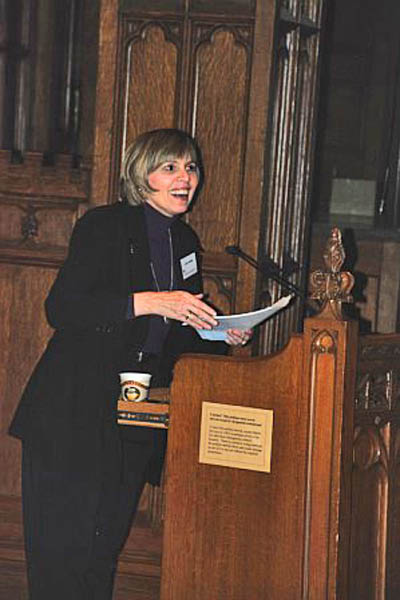
Please click in the middle of the picture on the left to see more photos of the Public Event from Evelin's camera. Please click in the middle of the picture on the right to see more photos of the Public Event from Brian's camera.• Humiliation in a Globalizing World: Does Humiliation Become the Most Disruptive Force?
Evelin Lindner, Founding Director and President of HumanDHS
If you wish to learn more about the overall aim of the HumanDHS work, please read a transcription of Evelin's explanations that were part of her introductory presentation this morning. If you wish to see a brief introduction to her theory of humiliation, please see the first issue of the Journal of Human Dignity and Humiliation Studies, March 2007.
- Dear Lynn King asked about the story of the pilot. Please see Evelin's comment.
- Dear Michael Sayler asked how Evelin feels while engaging in her work for HumanDHS. Please see Evelin's comment.
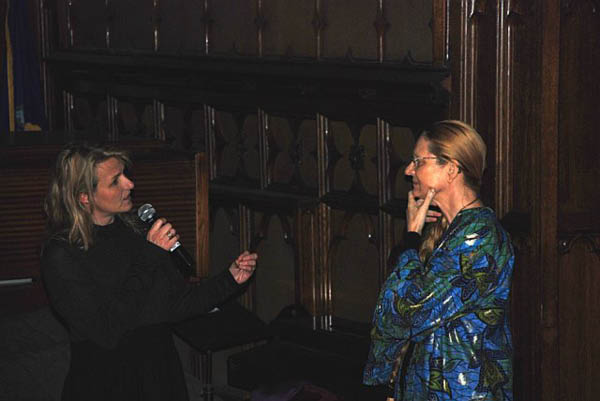
Please click in the middle of the picture on the left to see more photos of the Public Event from Evelin's camera. Please click in the middle of the picture on the right to see more photos of the Public Event from Brian's camera.
• 7.50-8.00 pm Musical Farewell by Ragnhild Nilsen


Please click in the middle of the picture on the left to see more photos of the Public Event from Evelin's camera. Please click in the middle of the picture on the right to see more photos of the Public Event from Brian's camera.
• 8.00 pm End of Our Public Event!
Day Two, Friday, December 14, 2007
10.00 am Welcoming All Participants
Sharon Burde introduced to us Ami Dayan, Director of the play "Masked," a play by an Israeli playwright about three Palestinian brothers at the DR2 theater in Union Square, NY, a powerful, provocative, compelling play about the conflict between, within, and around this family caught in the conundrum of the Middle East situation.

Please click in the middle of the picture on the left to see more photos of Day Two from Evelin's camera. Please click in the middle of the picture on the right to see more photos of Day Two from Brian's camera.
10.30 am - 11.15 am Michael Britton kindly accepted our invitation to hold our Don Klein Celebration Lecture for Don Klein's originally planned lecture The Humiliation Dynamic: Looking Back... Looking Forward

Please click in the middle of the picture on the left to see more photos of Day Two from Evelin's camera. Please click in the middle of the picture on the right to see more photos of Day Two from Brian's camera.Donald Klein, Union Institute and University, Cincinnati, Ohio, USA. Donald Klein is a Member of the HumanDHS Board of Directors, a Member of the HumanDHS Global Advisory Board and Global Core Team.
To our immense sadness, our beloved Don Klein passed away in June 2007. We are heartbroken. We commemorate his memory with great love. He spoke to us about Awe and Wonderment. About our human ability to live in awe and wonderment, not just when we see a beautiful sun set or the majesty of the ocean, but always. That we can live in a state of awe and wonderment. And we do that, says Don, by leaving behind the psychology of projection. The psychology of projection is like a scrim, a transparent stage curtain, where you believe that what you see is reality only as long as the light shines on it in a certain way. However, it is not reality. It is a projection. And in order to live in awe and wonderment, we have to look through this scrim and let go of all the details that appear on it, in which we are so caught up. When we do that, we can see the beautiful sun set, the majestic ocean, always, in everything. We will continue our work while keeping Don’s words at the center of our work and in our hearts.
11.15 pm - 1.00 pm Round Table 2: How Can the Notion of Humiliation Be Useful for Public Policy Planning and for Cultivating Positive Social Change?
There are four ways to participate in a Round Table: As a discussant, a moderator, a note taker/rapporteur, and a supporter
Moderators: Maggie O'Neill & Philip Brown (Moderators are invited to temporarily switch into the role of discussants if they wish)
Seating Manager: Rick Slaven
Helpers: Kathryn Crawford, Michael Britton, Brian Lynch, Jennifer Kirby, Robert English, Marta Carlson, Camilla Hsiung, Antoinette Errante, Hua-Chu Yen


Please click in the middle of the picture on the left to see more photos of Day Two from Evelin's camera. Please click in the middle of the picture on the right to see more photos of Day Two from Brian's camera.
Participants:
• Beth Fisher-Yoshida
Reframing Conflict: Intercultural Conflict as Potential Transformation (2005)

Please click in the middle of the picture on the left to see more photos of Day Two from Evelin's camera. Please click in the middle of the picture on the right to see more photos of Day Two from Brian's camera.
• Anie Kalayjian
Turkish Denial of the Genocide of Armenians, Greeks, Assyrians: Transforming Humiliation into Understanding and Forgiveness (2005)

Please click in the middle of the picture on the left to see more photos of Day Two from Evelin's camera. Please click in the middle of the picture on the right to see more photos of Day Two from Brian's camera.• Bertram Wyatt-Brown
T. E. Lawrence, honor and humiliation in the Middle East (2007)
The Psychology of Humiliation: Mann’s “Mario and the Magician” and Hawthorne’s “Major Molineux, My Kinsman” (2006)

Please click in the middle of the picture on the left to see more photos of Day Two from Evelin's camera. Please click in the middle of the picture on the right to see more photos of Day Two from Brian's camera.
• Anne Wyatt-Brown
A Challenge to Medical Hierarchies (2007)
Humiliation in My Brother’s Image (2006)

Please click in the middle of the picture on the left to see more photos of Day Two from Evelin's camera. Please click in the middle of the picture on the right to see more photos of Day Two from Brian's camera.• Sharon Burde
The Role of Women in Addressing the Impact of Humiliation and Changing Course (2007)

Please click in the middle of the picture on the left to see more photos of Day Two from Evelin's camera. Please click in the middle of the picture on the right to see more photos of Day Two from Brian's camera.• Roger Bromley
Dignity and Hope Versus Humiliation and Despair (2007)
(please see here a longer draft for a full paper and a summary)
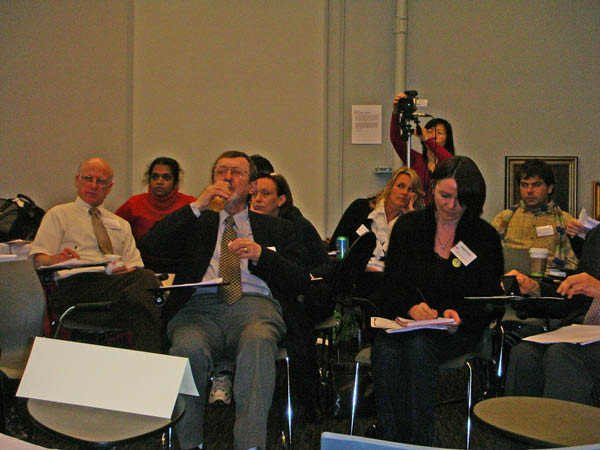
Please click in the middle of the picture on the left to see more photos of Day Two from Evelin's camera. Please click in the middle of the picture on the right to see more photos of Day Two from Brian's camera.• Jennifer Goldman
Humiliation and Aggression (2006)
A Theoretical Understanding of How Emotions Fuel Intractable Conflict: The Case of Humiliation (2005, together with Peter T. Coleman)

Please click in the middle of the picture on the left to see more photos of Day Two from Evelin's camera. Please click in the middle of the picture on the right to see more photos of Day Two from Brian's camera.• Vinod (VK) Kool
Humiliating Perpetrator, Victim and Observer: Lessons from the Oldest Democracy Located in the Himalayas (2007)

Please click in the middle of the picture on the left to see more photos of Day Two from Evelin's camera. Please click in the middle of the picture on the right to see more photos of Day Two from Brian's camera.• Maria Volpe (unfortunately hindered to join us)
The Association for Conflict Resolution Crisis Intervention online newsletter featured this presentation in its 2006 February issue.• Edward Emery (unfortunately hindered to join us)
Malignant Shame and the Role of Psychic Deadness in Its Genesis in Relationship to the Thinning of Attachment Bonds (2007)• Philip Brown
The Role of Dignity and Humiliation for Character Education (2007)

Please click in the middle of the picture on the left to see more photos of Day Two from Evelin's camera. Please click in the middle of the picture on the right to see more photos of Day Two from Brian's camera.• Maggie O'Neill
Humiliation and Human Dignity: Conducting Participatory Action Research with Women Who Sell Sex (2007, see www.safetysoapbox.co.uk)

Please click in the middle of the picture on the left to see more photos of Day Two from Evelin's camera. Please click in the middle of the picture on the right to see more photos of Day Two from Brian's camera.
Supporters (supporters participate by using the two empty chairs in each Round Table; please see a list of supporters to all three Round Tables here):
• Andrea Bartoli (Andrea kindly joined us in the beginning and at the end of Day One)
Deconstructing International Deadly Conflicts (2004)• Arie Nadler
- Intergroup Reconciliation: Effects of Adversary’s Expressions of Empathy, Responsibility, and Recipients’ Trust, in Personality and Social Psychology Bulletin, 2006, 32 (4, April), pp. 459-470, together with Ido Liviatan.
- Instrumental and Socio-Emotional Paths to Intergroup Reconciliation and the Need-Based Model of Socio-Emotional Reconciliation, to appear in: A. Nadler, T. Malloy & J.D. Fisher (eds.) Social Psychology of Intergroup Reconciliation. New York, NY: Oxford University Press, together with Nurit Shnabel, 2006.
- Inter-Group Helping as Status Organizing Processes: Implications for Inter-Group Misunderstandings, in press in: Demoulin, S., Leyens, J.P. & Dovidio, J.F. (Eds.): Intergroup Misunderstandings: Impact of Divergent Social Realities. Washington, DC: Psychology Press, April 2007, revised version, together with Samer Halabi, and Gal Harpaz-Gorodeisky.• Sibyl Ann Schwarzenbach
Humiliation, Dignity and Friendship (2006)• Grace Feuerverger
- The "School For Peace": A Conflict Resolution Program in a Jewish-Palestinian Village (2005)
- Grace also presents her second book Teaching, Learning and Other Miracles (2007)• Ragnhild Nilsen, John John Bruseth, and Irmelin Drake
The Role of Dignity and Humiliation for Fair Trade (2007)• Emanuela C. Del Re
The Role of Dignity and Humiliation for Security (2007)• Michael Britton
Connecting the Deep Personal Experiences of Being in Historical Contexts with Reaching Outward Around the Globe (2006)• Judy Kuriansky (unfortunately hindered to join us)
Transforming Conflict and Humiliation to Heal Hearts in the Holy Land: People-to-People Projects to Build Peace, Coexistence and Cooperation between Palestinians and Israelis (2006)• George Woods (unfortunately hindered to join us)
The Role of Dignity and Humiliation for Developing New Non-Western Psychology (2007)• Annette Anderson-Engler (unfortunately hindered to join us)
- Constructing and Reconstructing Narratives – A Passageway to Personal Meaning and Social Change (2007)
- Displaced Identity and Humiliation in Children of Vietnam Veterans (2005)• Merle Lefkoff (unfortunately hindered to join us)
When the Butterfly Flaps Her Wings in Gaza (2005)• Rosita Albert (unfortunately hindered to join us)
Violent Interethnic Conflict and Human Dignity: Major Issues in Intercultural Research and Knowledge Utilization (2006)• Aura Sofia Diaz (unfortunately hindered to join us)
The Role of Dignity and Humiliation for the Mind and Peace (2007)• Victoria C. Fontan (unfortunately hindered to join us)
Shame, Humiliation, and Violent Conflict (2007)• James E. Jones (unfortunately hindered to join us)
The Post Victim Ethical Exemption Syndrome: An Outgrowth of Humiliation (2006)
The Third Force: A Practical, Community-Building: Approach to Settling Destructive Conflicts (2004)• Olga Botcharova (unfortunately hindered to join us)
Olga presents an adaptation of Implementation of Track Two Diplomacy: Developing a Model of Forgiveness, in Helmick, Raymond G. and Petersen, Rodney L. (Eds.), Forgiveness and Reconciliation: Religion, Public Policy and Conflict Transformation (pp. 269-293). Philadelphia, PA: Templeton Foundation Press.Please see here the supporters of all three Round Tables
The History of Round Table 2:
Round Table 2, 2006
The title of Round Table 2 in 2006 was How can the notion of humiliation be useful for public policy planning and for cultivating positive social change?
The moderators were Maggie O'Neill & Philip Brown
Please see the participants and their contributions hereRound Table 2, 2005
The title of Round Table 2 in 2005 was Is Humiliation Relevant in Destructive Conflict?
The moderators were Judith Thompson & Manas Ghanem
Please see the participants and their contributions hereRound Table 2, 2004
The title of Round Table 2 in 2004 was Is Humiliation Relevant in Destructive Conflict?
The moderators were: Carlos Sluzki & Donald C. Klein
Please see the participants and their contributions here
1.00 pm - 1.15 pm The Moderators Summarized the Round Table Discussion and Identified
1. three "Key Learning Points" from the discussion
2. one question/consideration for continued inquiry
3. one idea for action
1.15 pm - 2.00 pm Catered Lunch & Announcements
2.00 pm - 3.45 pm Round Table 3: What Works? What Types of Social Change Efforts Show Promise in Reducing Violent Conflict and Humiliation While Upholding the Dignity of All People?
There are four ways to participate in a Round Table: As a discussant, a moderator, a note taker/rapporteur, and a supporter
Moderators: Emanuela C. Del Re & Carlos E. Sluzki (Moderators are invited to temporarily switch into the role of discussants if they wish)
Seating Manager: Rick Slaven
Helpers: Kathryn Crawford, Michael Britton, Brian Lynch, Jennifer Kirby, Robert English, Marta Carlson, Camilla Hsiung, Antoinette Errante, Hua-Chu Yen


Please click in the middle of the picture on the left to see more photos of Day Two from Evelin's camera. Please click in the middle of the picture on the right to see more photos of Day Two from Brian's camera.
Evelin's camera failed and there are unfortunately no pictures of Round Table 2 on it.
Participants:
• Maggie O'Neill
Humiliation and Human Dignity: Conducting Participatory Action Research with Women Who Sell Sex (2007, see www.safetysoapbox.co.uk)

Please click in the middle of the picture on the left to see more photos of Day Two from Evelin's camera. Please click in the middle of the picture on the right to see more photos of Day Two from Brian's camera.
Evelin's camera failed and there are unfortunately no pictures of Round Table 2 on it.• Gay Rosenblum-Kumar
Humiliation, Conflict and Public Policy (2004)
Horizontal Inequality and Humiliation: Public Policy for Disaffection or Cohesion? (2005)

Please click in the middle of the picture on the left to see more photos of Day Two from Evelin's camera. Please click in the middle of the picture on the right to see more photos of Day Two from Brian's camera.
Evelin's camera failed and there are unfortunately no pictures of Round Table 2 on it.• Grace Feuerverger
- The "School For Peace": A Conflict Resolution Program in a Jewish-Palestinian Village (2005)
- Grace also presents her second book Teaching, Learning and Other Miracles (2007)

Please click in the middle of the picture on the left to see more photos of Day Two from Evelin's camera. Please click in the middle of the picture on the right to see more photos of Day Two from Brian's camera.
Evelin's camera failed and there are unfortunately no pictures of Round Table 2 on it.• Lone Alice Johansen
African Solutions to African Intergroup Conflicts: Ubuntu and Humiliation - A Study of Ubuntu and Its Effect on Perceived Humiliation in a Interactive Track Two Dialogue Seminar (2007)
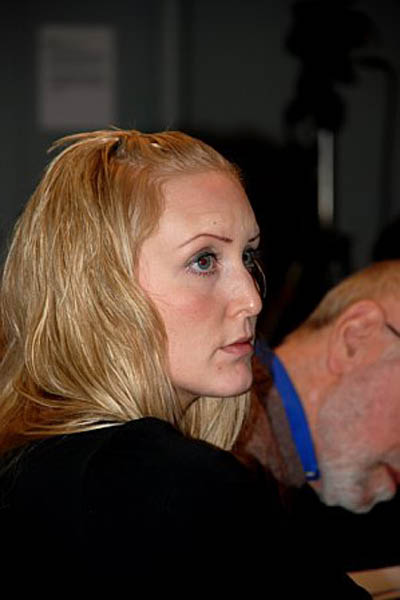
Please click in the middle of the picture on the left to see more photos of Day Two from Evelin's camera. Please click in the middle of the picture on the right to see more photos of Day Two from Brian's camera.
Evelin's camera failed and there are unfortunately no pictures of Round Table 2 on it.• Lynn King
Founder of SageVISION, dedicated to "growing green leaders who support innovation for the greater good."

Please click in the middle of the picture on the left to see more photos of Day Two from Evelin's camera. Please click in the middle of the picture on the right to see more photos of Day Two from Brian's camera.
Evelin's camera failed and there are unfortunately no pictures of Round Table 2 on it.• Garry Davis
- Garry Davis’s Speech at the 2007 Workshop on Humiliation and Violent Conflict (2007)
- Press Release, 12/5/07

Please click in the middle of the picture on the left to see more photos of Day Two from Evelin's camera. Please click in the middle of the picture on the right to see more photos of Day Two from Brian's camera.
Evelin's camera failed and there are unfortunately no pictures of Round Table 2 on it.• Yoav Peck
Human Dignity in Israeli Elementary Schools: A Rationale for a Project in Nine Schools (2007)

Please click in the middle of the picture on the left to see more photos of Day Two from Evelin's camera. Please click in the middle of the picture on the right to see more photos of Day Two from Brian's camera.
Evelin's camera failed and there are unfortunately no pictures of Round Table 2 on it.• Judy Kuriansky (unfortunately hindered to join us)
Transforming Conflict and Humiliation to Heal Hearts in the Holy Land: People-to-People Projects to Build Peace, Coexistence and Cooperation between Palestinians and Israelis (2006)• Victoria C. Fontan (unfortunately hindered to join us)
Shame, Humiliation, and Violent Conflict (2007)• Rosita Albert (unfortunately hindered to join us)
Violent Interethnic Conflict and Human Dignity: Major Issues in Intercultural Research and Knowledge Utilization (2006)• Aura Sofia Diaz (unfortunately hindered to join us)
The Role of Dignity and Humiliation for the Mind and Peace (2007)• Annette Anderson-Engler (unfortunately hindered to join us)
- Constructing and Reconstructing Narratives – A Passageway to Personal Meaning and Social Change (2007)
- Displaced Identity and Humiliation in Children of Vietnam Veterans (2005)• George Woods (unfortunately hindered to join us)
The Role of Dignity and Humiliation for Developing New Non-Western Psychology (2007)• Kathleen Freis (unfortunately hindered to join us)
Sharing the Challenges of Hierarchical School Structures As they Relate to Human Dignity (2007)• Jiuquan Han (unfortunately, not able to attend, due to lack of funds)
"Five Penalties": A Psychological-Cultural-Social-Historical Construct (2007)• Carlos E. Sluzki
- Analysis of an Extraordinary Political Discourse (2007)
- Humiliation and the Moral Authority to Exert Violence upon Others (2007)
- Elements of Humiliation-Shame Dynamics for Computational Modeling and Analysis of Real-Life Scenarios (2004)
- The Story of the Crying Composer told at the Workshop on Humiliation and Violent Conflict, NY (2004)
- Humiliation Therapeutics (powerpoint presentation, 2004)

Please click in the middle of the picture on the left to see more photos of Day Two from Evelin's camera. Please click in the middle of the picture on the right to see more photos of Day Two from Brian's camera.
Evelin's camera failed and there are unfortunately no pictures of Round Table 2 on it.• Emanuela C. Del Re
The Role of Dignity and Humiliation for Security (2007)
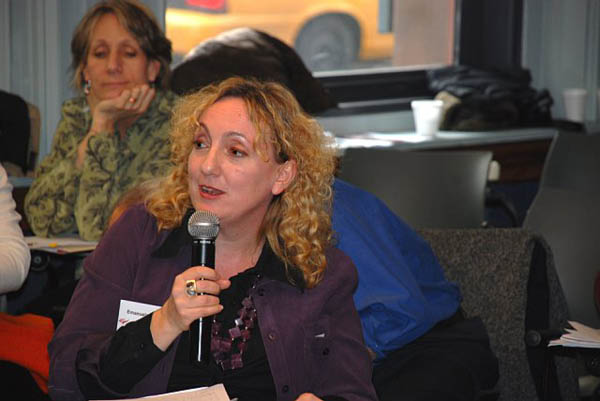
Please click in the middle of the picture on the left to see more photos of Day Two from Evelin's camera. Please click in the middle of the picture on the right to see more photos of Day Two from Brian's camera.
Evelin's camera failed and there are unfortunately no pictures of Round Table 2 on it.
Supporters (supporters participate by using the two empty chairs in each Round Table; please see a list of supporters to all three Round Tables here):
• Anie Kalayjian
Turkish Denial of the Genocide of Armenians, Greeks, Assyrians: Transforming Humiliation into Understanding and Forgiveness (2005)
• Andrea Bartoli (Andrea kindly joined us in the beginning and at the end of Day One)
Deconstructing International Deadly Conflicts (2004)• Arie Nadler
- Intergroup Reconciliation: Effects of Adversary’s Expressions of Empathy, Responsibility, and Recipients’ Trust, in Personality and Social Psychology Bulletin, 2006, 32 (4, April), pp. 459-470, together with Ido Liviatan.
- Instrumental and Socio-Emotional Paths to Intergroup Reconciliation and the Need-Based Model of Socio-Emotional Reconciliation, to appear in: A. Nadler, T. Malloy & J.D. Fisher (eds.) Social Psychology of Intergroup Reconciliation. New York, NY: Oxford University Press, together with Nurit Shnabel, 2006.
- Inter-Group Helping as Status Organizing Processes: Implications for Inter-Group Misunderstandings, in press in: Demoulin, S., Leyens, J.P. & Dovidio, J.F. (Eds.): Intergroup Misunderstandings: Impact of Divergent Social Realities. Washington, DC: Psychology Press, April 2007, revised version, together with Samer Halabi, and Gal Harpaz-Gorodeisky.• Roger Bromley
Dignity and Hope Versus Humiliation and Despair (2007)
(please see here a longer draft for a full paper and a summary)• Sibyl Ann Schwarzenbach
Humiliation, Dignity and Friendship (2006)• Bertram Wyatt-Brown
T. E. Lawrence, honor and humiliation in the Middle East (2007)
The Psychology of Humiliation: Mann’s “Mario and the Magician” and Hawthorne’s “Major Molineux, My Kinsman” (2006)
• Anne Wyatt-Brown
A Challenge to Medical Hierarchies (2007)
Humiliation in My Brother’s Image (2006)• Sharon Burde
The Role of Women in Addressing the Impact of Humiliation and Changing Course (2007)• Jennifer Goldman
Humiliation and Aggression (2006)
A Theoretical Understanding of How Emotions Fuel Intractable Conflict: The Case of Humiliation (2005, together with Peter T. Coleman)• Michael Britton
Connecting the Deep Personal Experiences of Being in Historical Contexts with Reaching Outward Around the Globe (2006)• Philip Brown
The Role of Dignity and Humiliation for Character Education (2007)• Maggie O'Neill
Humiliation and Human Dignity: Conducting Participatory Action Research with Women Who Sell Sex (2007, see www.safetysoapbox.co.uk)• Beth Fisher-Yoshida
Reframing Conflict: Intercultural Conflict as Potential Transformation (2005)• Merle Lefkoff (unfortunately hindered to join us)
When the Butterfly Flaps Her Wings in Gaza (2005)• Maria Volpe (unfortunately hindered to join us)
The Association for Conflict Resolution Crisis Intervention online newsletter featured this presentation in its 2006 February issue.• James E. Jones (unfortunately hindered to join us)
The Post Victim Ethical Exemption Syndrome: An Outgrowth of Humiliation (2006)
The Third Force: A Practical, Community-Building: Approach to Settling Destructive Conflicts (2004)• Edward Emery (unfortunately hindered to join us)
Malignant Shame and the Role of Psychic Deadness in Its Genesis in Relationship to the Thinning of Attachment Bonds (2007)• Olga Botcharova (unfortunately hindered to join us)
Olga presents an adaptation of Implementation of Track Two Diplomacy: Developing a Model of Forgiveness, in Helmick, Raymond G. and Petersen, Rodney L. (Eds.), Forgiveness and Reconciliation: Religion, Public Policy and Conflict Transformation (pp. 269-293). Philadelphia, PA: Templeton Foundation Press.Please see here the supporters of all three Round Tables
The History of Round Table 3:
Round Table 3, 2006
The title of Round Table 3 in 2006 was What Works? What Types of Social Change Efforts Show Promise in Reducing Violent Conflict and Humiliation While Upholding the Dignity of All People?
The moderators were Nora Femenia & Kathleen Freis
Please see the participants and their contributions hereRound Table 3, 2005
The title of Round Table 3 in 2005 was Can the Notion of Humiliation Be Useful for Public Policy Planning? What Can We Envisage As Best Practice Models?
The moderators were Annette Engler, Ana Ljubinkovic & Miriam Marton
Please see the participants and their contributions hereRound Table 3, 2004
The title of Round Table 3 in 2004 was Can the Notion of Humiliation Be Useful for Public Policy Planning? What Can We Envisage As Best Practice Models?
The moderators were Donald C. Klein & Linda Hartling
Please see the participants and their contributions here
3.45 pm - 4.00 pm The Moderators Summarized the Round Table Discussion and Identified
1. three "Key Learning Points" from the discussion
2. one question/consideration for continued inquiry
3. one idea for action
Supporters of all Three Round Tables
• Peter Liberman
Humiliation and Retribution (2007)• Clark McCauley
Author of Why Not Kill Them All? The Logic and Prevention of Mass Political Murder (Princeton University Press, 2006, together with Daniel Chirot)
Understanding Humiliation As Suppressed Anger (2006)• Emanuela C. Del Re
The Role of Dignity and Humiliation for Security (2007)• Gay Rosenblum-Kumar
Humiliation, Conflict and Public Policy (2004)
Horizontal Inequality and Humiliation: Public Policy for Disaffection or Cohesion? (2005)• Michael Greene
The Role of Humiliation for the Generation of Violence (2007)• Joseph Martz
A Model to Forecast Conflict and Intervene Proactively (2007)• Florina Benoit & Ashok Gladston Xavier
The Life of Sri Lankan Refugees A Paradigm Shift (2007)• Alison Anthoine
The Role of Dignity and Humiliation in the Delivery of Healthcare Services (2006)• William McConochie
The Role of Dignity and Humiliation for Political Psychology (2007)• Floyd Webster Rudmin
Preventing Inadvertent Humiliation (2006)
Six Research Designs on Humiliation (2005)• Marta Carlson
How Organizations Can Prevent Conflict Through the Use of Bert Hellinger's Work (2007)• Bill Leland
Dignity, Humiliation, and Mutual Empowerment for Fundamental Change (2007)
• Brian Lynch
Silvan Tomkins' Conceptualization of Humiliation
Abstract presented at the Second International Conference on Multicultural Discourses, 13-15th April 2007, Institute of Discourse and Cultural Studies, & Department of Applied Psychology, Zhejiang University, Hangzhou, China, as part of the 9th Annual Meeting of Human Dignity and Humiliation Studies.
Thank you, dear Brian, for taking such wonderful pictures at our workshop, and uploading them on www.kodakgallery.com!• Judit Révész
The Role of Dignity and Humiliation for Organization Development and Change (2007)
As a third party, consultant, working collaboratively with the client system, I always need to be mindful that the helping dynamics between client and consultant has to be a dignifying one first.• Michael Sayler
- Humiliation and the Poor: A Study in the Management of Meaning (Ph.D. dissertation, Fielding Graduate Institute, 2004, available through the University of Michigan dissertation service)
- Tracking Humiliation with CMM (2007)• Christina M. Capodilupo
Racial Microaggressions in Everyday Life: Implications for Clinical Practice (2007)• Ariel Lublin
Fostering Connection and Positive Outcomes through Appreciation and Optimism (2006)• Antoinette Errante
Educational Policy, Leadership and the Role of Humiliation (2007)• Nora Femenia
Healing Humiliation and the Need for Revenge (2007)• Kathryn Crawford
A New Paradigm for Education, a Paradigm that Dignifies and Avoids Humiliation (2007)• Ellen Raider
Humiliating Experiences that Parents and Students Face in Schools (using info from the report, our tribunals, and our "Education is a Human Rights" campaign) (2007)
- See also The National Economic & Social Rights Initiative (NESRI) report "Deprived of Dignity" (2007)• Noel Mordana
Humiliation Politics (2004)• Arye Rattner (unfortunately hindered to join us)
Surveying Humiliation (2006)• Michael Kimmel (unfortunately hindered to join us)
Men, Masculinity, and the Role of Humiliation (2007)
Supporter: Nick Martin
Exploring Possibilities for UPEACE in China: Peace Education, Project Development Report (2006)• Elizabeth Sullivan (unfortunately hindered to join us)
The National Economic & Social Rights Initiative (NESRI) report "Deprived of Dignity" (2007)• Magnus Haavelsrud (unfortunately hindered to join us)
The Role of Dignity and Humiliation for Education (2007)• Hassan Abdi Keynan (unfortunately hindered to join us)
Humiliation in the Context of Recent Events in the Horn of Africa (2007)• Barry Hart (unfortunately hindered to join us)
Peacebuilding for Traumatized Societies - With an Emphasis on the Role of Large-Scale Humiliation and How to Deal With It through Trauma Recovery and Peacebuilding Processes (2006)• Miriam Marton (unfortunately hindered to join us)
The Dual Humiliation of Female Refugees by Sexually Violent, Gender-based Acts (2005)• Mercedes St. Elin (unfortunately hindered to join us)
Dignity-Humiliation in the Case of Internally Displaced Persons in Latin America: The Examples of Colombia, Guatemala, Peru and Mexico (2005)• Pamela H. Creed (unfortunately hindered to join us)
The Dominant American Narrative between 9/11/01 and the Invasion of Iraq (2006)• Harold W. Becker & John T. Goltz (unfortunately hindered to join us)
Love, Dignity, and Humiliation (2007)• David Jones (unfortunately hindered to join us)
Shock and Awe - The impact of working with highly traumatized groups while conducting field work: Utter & Complete Disaster (2007)• Dr. Stacee L. Reicherzer (unfortunately hindered to join us)
Betrayal in the Land of the Free: Understanding the Impact of Erasure, Humiliation, and Exploitation of Gay, Lesbian, Bisexual, and Transgender Peoples of the United States (2007)• Navaraj Pudasaini (unfortunately hindered to join us)
Deteriorating Rights Situation in Nepal (2007)• Hayal Köksal (unfortunately, not able to attend, due to lack of funds)
The Role of Dignity and Humiliation for Education (2007)• Nariman Abdel Kader (unfortunately, not able to attend, due to lack of funds)
Egyptian Woman and Their Experiences with Humiliation (2007)• Bahija Jamal (unfortunately hindered to join us, due to lack of funds)
Women Victims of Human Trafficking in Globalized World of Entertainment and Sex Industry: Humiliation of Women Dignity and Existence (2007)• Zuzana Luckay (unfortunately, not able to attend, due to lack of funds)
- The Role of Literature in Human Rights: Studying The Art of the Novel Through the Texts of Milan Kundera, J.M. Coetzee and Ernesto Sabato
Presentation in Durban, South Africa, July 2007
- Violence, Crime and Fear in Contemporary South-African Literature
Presentation at the Violence, Hostility and the Construction of Enemies Conference, 2nd May - 5th May 2007, Budapest, Hungary
- Restoring Social Order in Post-Apartheid South Africa: The Role of Public Confession and Private Repentance in the Administration of Transitional Justice
Abstract of a presentation at the Global Political and Social Order Conference, Prague, Czech Republic, 2006.• Fazeela Zaib & Othman Al-Tawalbeh (unfortunately, not able to attend, due to lack of funds)
Islam in Its Connection with Dignity and Humiliation (2007)• Mohammad Abul Kalam Azad (unfortunately, not able to attend, due to lack of funds)
Peace and Stability in Bangladesh through Peace, Charity and Sustainable Development Education (2006)• Myra Mendible (unfortunately, Myra is hindered to join us)
Mediated Humiliations: Spectacles of Power in Postmodern Culture (2005)• Stephanie Heuer (unfortunately, Stephanie is hindered to join us)
From Nobody to Somebody: Undoing Humiliation (2007)
Observers to all Three Round Tables
• Alice Nduwimana and Cesar Bitwara (unfortunately hindered to join us)
• Luda Bryzzheva (unfortunately hindered to join us)
4.00 pm - 4.15 pm Small Break
4.15 pm - 5.00 pm Wrapping up Day Two of Our Workshop
Everybody shared ONE thing that we took home from our workshop!
If we have more time in our next workshop, we wish to also collect ideas for collective planning about how to cooperate during the year, until we meet again in 2008. Among others, this would enable us to assess our progress along the way. Please see, for example, the HumanDHS' Work: Objectives and Evidence of Success, developed in cooperation between HumanDHS and ABSF.
5.00 pm End of Day Two of Our Workshop
List of Participants
(in all NY workshops so far)
Papers
All participants are warmly invited to send in papers.
Please notify us, if you wish to submit any of your papers also as a book chapter or as a journal article in our Journal of Human Dignity and Humiliation Studies.
Please see earlier submitted papers here:
• List of all Publications
• Papers, Abstracts, and Notes for the 2004 Workshop on Humiliation and Violent Conflict
• Papers, Abstracts, and Notes for the 2005 Workshop on Humiliation and Violent Conflict
• Papers, Abstracts, and Notes for the 2006 Workshop on Humiliation and Violent Conflict
Abstracts/Notes/Papers of 2007
Please see further down the papers/notes that participants send in prior to the workshop so that everybody can get acquainted with all others beforehand. (Please see last year's preliminary papers and notes)
See here the work by:
Andrea Bartoli
Linda Hartling
Donald Klein
Victoria Firmo-Fontan
Evelin LindnerMichael Sayler (2007)
Tracking Humiliation with CMM (2007)
Contribution presented at the 2007 Workshop on Humiliation and Violent Conflict, Columbia University, New York, December 13-14, 2007.Lee Beaumont (2007)
Metrics - A Practical Example, and Thoughts on a Measurements Plan (2007)
Contribution presented at the 2007 Workshop on Humiliation and Violent Conflict, Columbia University, New York, December 13-14, 2007.Sophie Schaarschmidt (2007)
Contribution presented at the 2007 Workshop on Humiliation and Violent Conflict, Columbia University, New York, December 13-14, 2007.Hroar Klempe & Torbjørn Rundmo (Department of Psychology, NTNU, Trondheim, Norway, 2007)
The Reliability and Validity of a Measurement Instrument of Culture Defined As Symbol Exchange (2007)
Contribution presented at the 2007 Workshop on Humiliation and Violent Conflict, Columbia University, New York, December 13-14, 2007, as Power Point presentation and as Pdf file.Sabina Alkire and Emma Samman (Oxford Poverty and Human Development Initiative, 2007)
Shortlisted Indicators on Humiliation, and a Note Explaining Research Interests and Progress to Date at OPHI (2007)
Contribution prepared for the 2007 Workshop on Humiliation and Violent Conflict, Columbia University, New York, December 13-14, 2007 (see also a Paper on Shame and Humiliation (2007) by Diego Zavaleta Reyles).Adenrele Awotona (2007)
The Role of Dignity and Humiliation for Rebuilding Sustainable Communities after Disasters
Presentation held at the 2007 Workshop on Humiliation and Violent Conflict, Columbia University, New York, December 13-14, 2007.Davis Garry (2007)
Garry Davis’s Speech at the 2007 Workshop on Humiliation and Violent Conflict
Speech held at the 2007 Workshop on Humiliation and Violent Conflict, Columbia University, New York, December 13-14, 2007.Nora Femenia (2007)
Healing Humiliation and the Need for Revenge
Paper submitted to the 2007 Workshop on Humiliation and Violent Conflict, Columbia University, New York, December 13-14, 2007.Navaraj Pudasaini (2007)
Deteriorating Rights Situation in Nepal
Paper submitted to the 2007 Workshop on Humiliation and Violent Conflict, Columbia University, New York, December 13-14, 2007.Roger Bromley (2007)
Dignity and Hope Versus Humiliation and Despair
Abstract presented at the 2007 Workshop on Humiliation and Violent Conflict, Columbia University, New York, December 13-14, 2007 (please see here a longer draft for a full paper and a summary).Edward J. Emery (2007)
Musings on Shame and Idolization
Abstract presented at the 2007 Workshop on Humiliation and Violent Conflict, Columbia University, New York, December 13-14, 2007.Hassan Abdi Keynan (2007)
Humiliation in the Context of Recent Events in the Horn of Africa
Abstract presented at the 2007 Workshop on Humiliation and Violent Conflict, Columbia University, New York, December 13-14, 2007.Bill Leland (2007)
Dignity, Humiliation, and Mutual Empowerment for Fundamental Change
Abstract presented at the 2007 Workshop on Humiliation and Violent Conflict, Columbia University, New York, December 13-14, 2007.Florina Benoit & Ashok Gladston Xavier (2006)
The Life of Sri Lankan Refugees A Paradigm Shift
Abstract presented at the Second International Conference on Multicultural Discourses, 13-15th April 2007, Institute of Discourse and Cultural Studies, & Department of Applied Psychology, Zhejiang University, Hangzhou, China.David Jones (2007)
Shock and Awe - The impact of working with highly traumatized groups while conducting field work: Utter & Complete Disaster
Abstract presented at the 2007 Workshop on Humiliation and Violent Conflict, Columbia University, New York, December 13-14, 2007.Bahija Jamal (2007)
Women Victims of Human Trafficking in Globalized World of Entertainment and Sex Industry: Humiliation of Women Dignity and Existence
Abstract presented at the 2007 Workshop on Humiliation and Violent Conflict, Columbia University, New York, December 13-14, 2007.Zuzana Luckay
- The Role of Literature in Human Rights: Studying The Art of the Novel Through the Texts of Milan Kundera, J.M. Coetzee and Ernesto Sabato
Presentation in Durban, South Africa, July 2007
- Violence, Crime and Fear in Contemporary South-African Literature
Presentation at the Violence, Hostility and the Construction of Enemies Conference, 2nd May - 5th May 2007, Budapest, Hungary
- Restoring Social Order in Post-Apartheid South Africa: The Role of Public Confession and Private Repentance in the Administration of Transitional Justice
Presentation at the Global Political and Social Order Conference, Prague, Czech Republic, 2006.Maggie O'Neill (2007)
Humiliation and Human Dignity: Conducting Participatory Action Research with Women Who Sell Sex (see www.safetysoapbox.co.uk)
Abstract presented at the 2007 Workshop on Humiliation and Violent Conflict, Columbia University, New York, December 13-14, 2007.Bertram Wyatt-Brown (2007)
T. E. Lawrence, honor and humiliation in the Middle East
Abstract presented at the 2007 Workshop on Humiliation and Violent Conflict, Columbia University, New York, December 13-14, 2007.
Anne Wyatt-Brown (2007)
A Challenge to Medical Hierarchies
Abstract presented at the 2007 Workshop on Humiliation and Violent Conflict, Columbia University, New York, December 13-14, 2007.Jiuquan Han (2007)
"Five Penalties": A Psychological-Cultural-Social-Historical Construct
Paper presented at the 2007 Workshop on Humiliation and Violent Conflict, Columbia University, New York, December 13-14, 2007.Michael L. Perlin (2007)
Humiliation and the Criminal Justice System: How Our Desire to Humiliate Contributes to Recidivism and, Ultimately, Injures Victims
Presentation presented at the 2007 Workshop on Humiliation and Violent Conflict, Columbia University, New York, December 13-14, 2007.James Edward Jones (2006)
The Post Victim Ethical Exemption Syndrome: An Outgrowth of Humiliation
Note presented at the 2006 Workshop on Humiliation and Violent Conflict, Columbia University, New York, December 14-15, 2006.Lone Alice Johansen (2007)
African Solutions to African Intergroup Conflicts: Ubuntu and Humiliation, A Study of Ubuntu and Its Effect on Perceived Humiliation in an Interactive Track Two Dialogue Seminar.Annette Anderson-Engler (2007)
Constructing and Reconstructing Narratives – A Passageway to Personal Meaning and Social Change
Abstract presented at the 2007 Workshop on Humiliation and Violent Conflict, Columbia University, New York, December 13-14, 2007.
Final Papers of 2007
(Please see last year's papers)
Arie Nadler (2006), together with Ido Liviatan
Intergroup Reconciliation: Effects of Adversary’s Expressions of Empathy, Responsibility, and Recipients’ Trust
In Personality and Social Psychology Bulletin, 2006, 32 (4, April), pp. 459-470.Arie Nadler (2006), together with Nurit Shnabel
Instrumental and Socio-Emotional Paths to Intergroup Reconciliation and the Need-Based Model of Socio-Emotional Reconciliation
To appear in: A. Nadler, T. Malloy & J.D. Fisher (eds.) Social Psychology of Intergroup Reconciliation. New York, NY: Oxford University Press.Arie Nadler (April 2007, revised Version), together with Samer Halabi, and Gal Harpaz-Gorodeisky
Inter-Group Helping as Status Organizing Processes: Implications for Inter-Group Misunderstandings
In press in: Demoulin, S., Leyens, J.P. & Dovidio, J.F. (Eds.): Intergroup Misunderstandings: Impact of Divergent Social Realities. Washington, DC: Psychology Press.
Ideas for More Round Table Topics
Your input is very welcome!
Floyd Webster Rudmin:
"Asymmetries in self-perceptions of being the humiliatee versus the humiliator"
"Archetypal humiliation in literature: A survey of English literature teachers"
Annette Engler:
"Constructing Narratives after Violent Conflict"
Annette kindly wrote on March 31, 2006: "I would like to discuss how individuals construct their narratives after traumatic experiences or event."
Dharm P. S. Bhawuk:
"Theory, Method, and Practice of Humiliation Research"
This could also be a topic for our Open Space
Ana Ljubinkovic:
"Assistance and Humiliation"
Varda Mühlbauer:
"Humiliation/Dignity in the Workplace"
"Humiliation/Dignity in the Family"
Zahid Shahab Ahmed:
"Humiliation and Child Sexual Abuse"
Victoria C. Fontan:
"Terrorism and Humiliation" and
"Armed Conflict, Escalation and Humiliation"
Miriam Marton:
"Consequences of Humiliation"
Jörg Calliess:
"How to Prepare 'Non-Psychologists' (Human Rights Defenders, Peace Keepers, etc.) for Dealing with the Trauma of Humiliation in Victims"
Emmanuel Ndahimana:
"Ignorance and Humiliation"
Arie Nadler:
"Justice and Humiliation"
Alicia Cabezudo:
"Interlinking Peace Education and Humiliation Studies: A Bridge for Crossing Borders"




